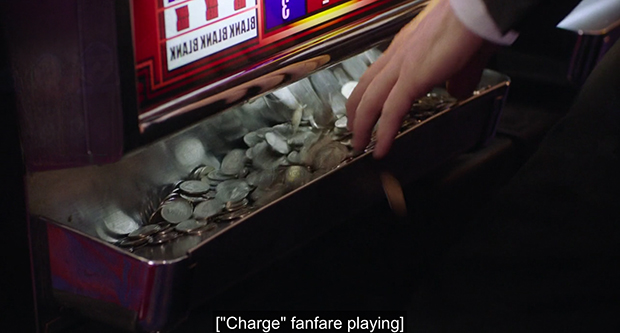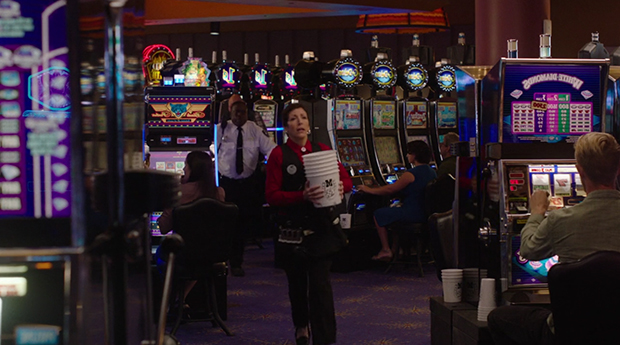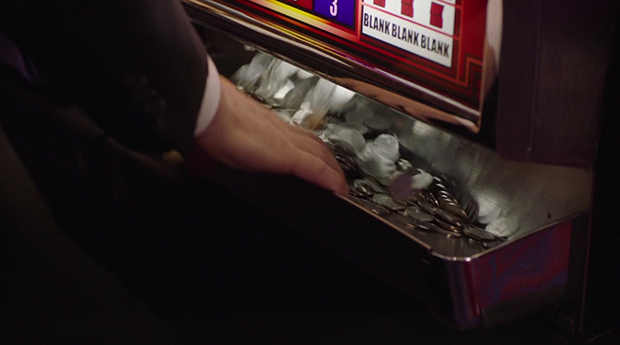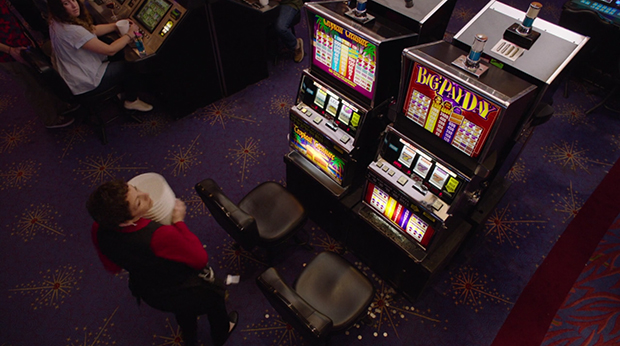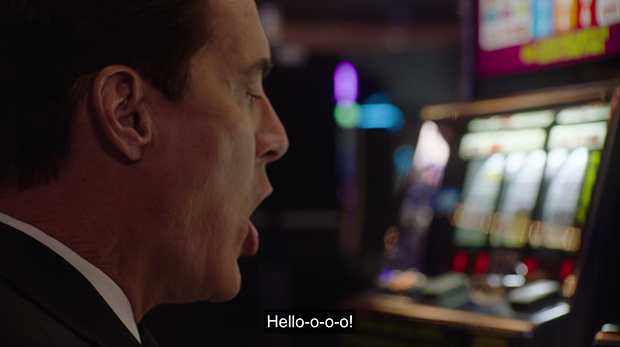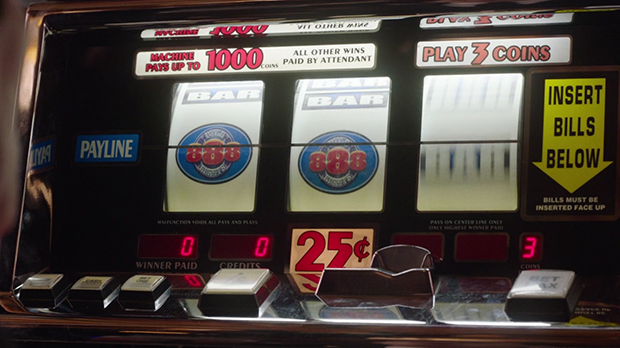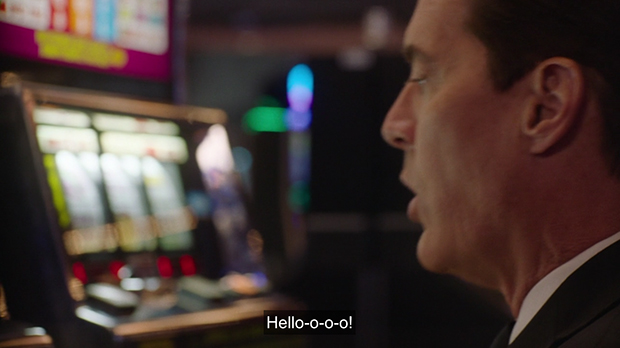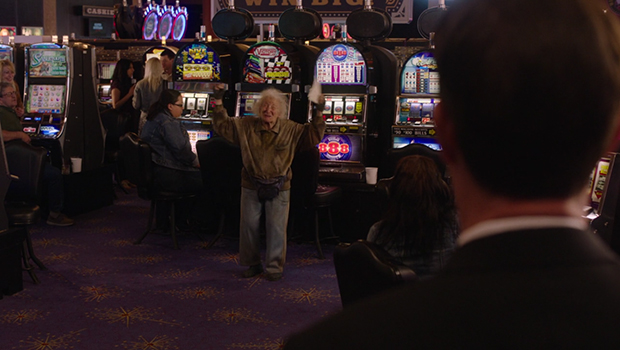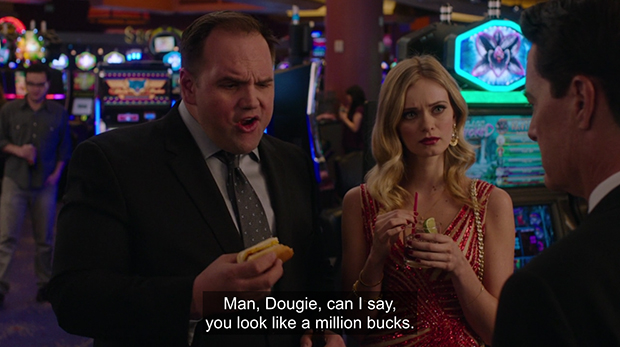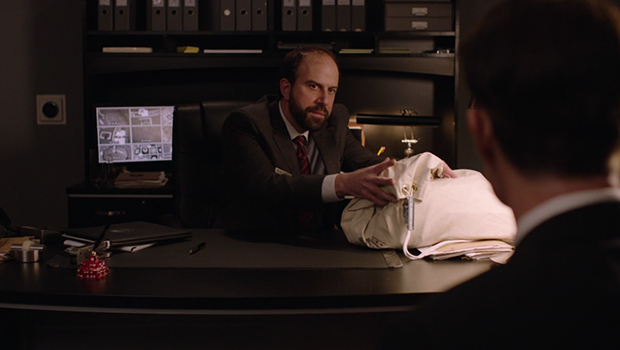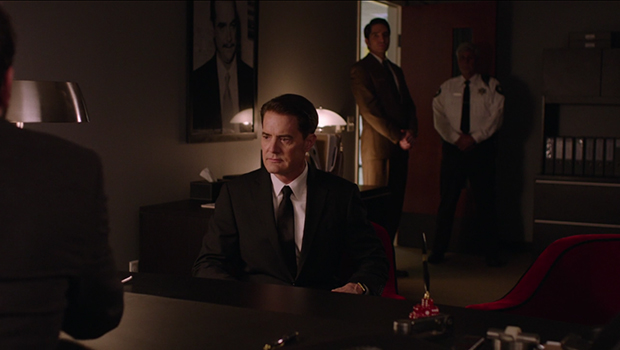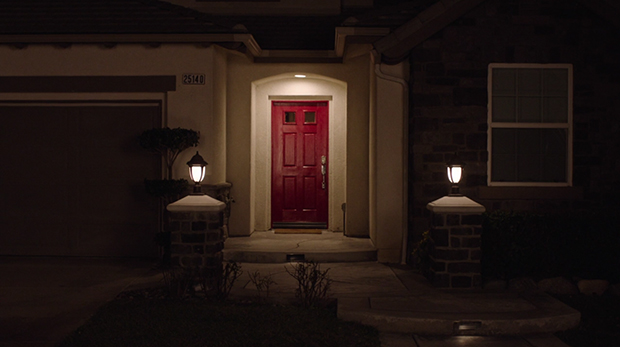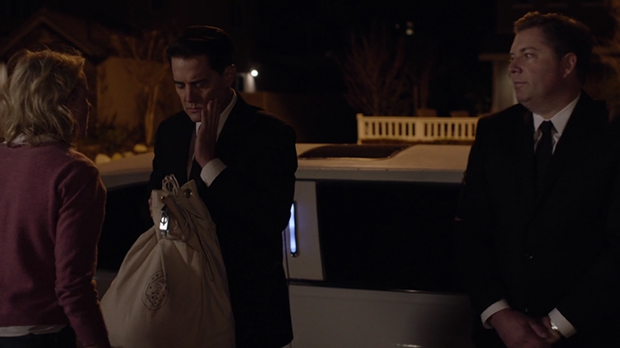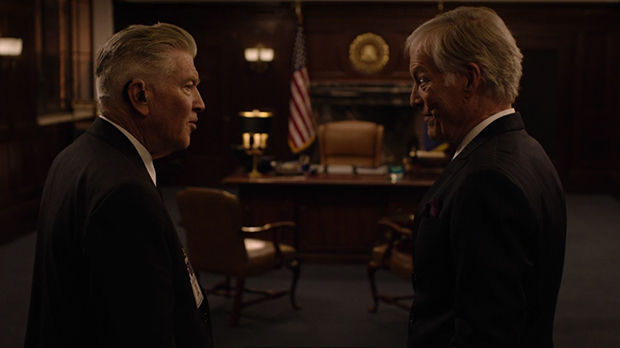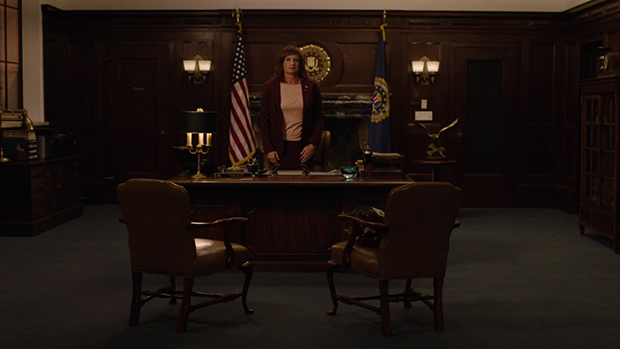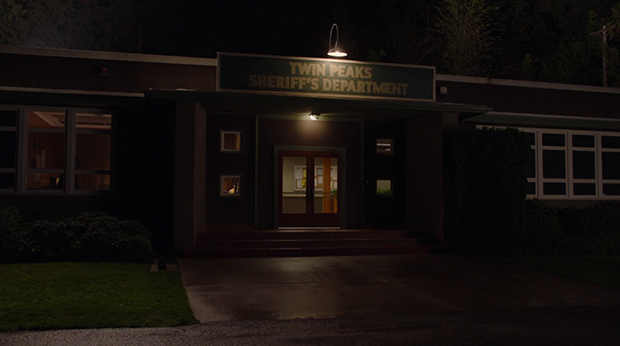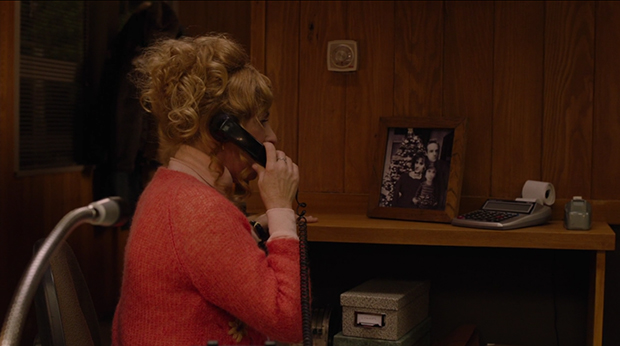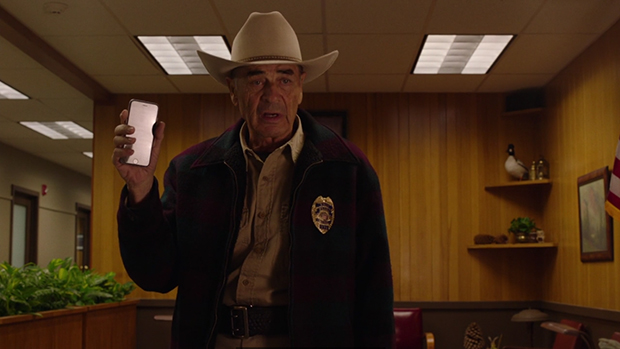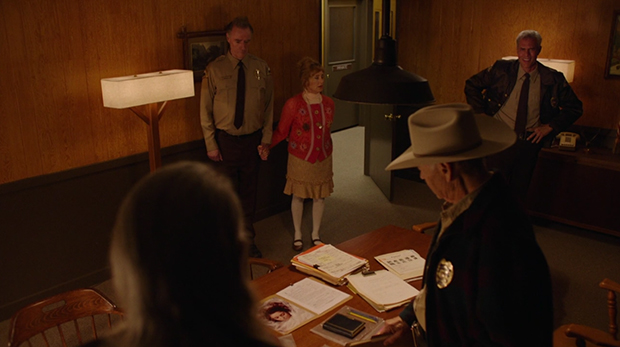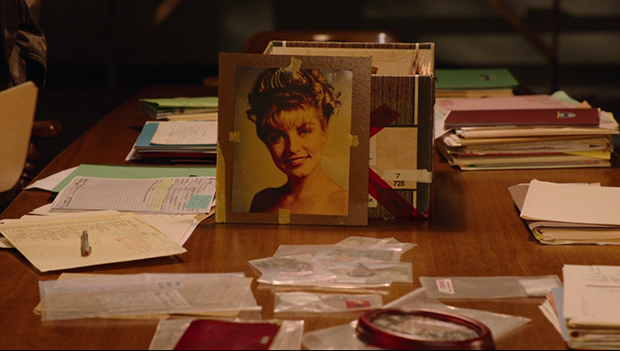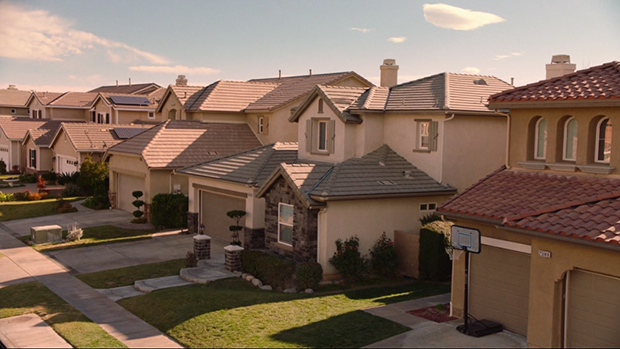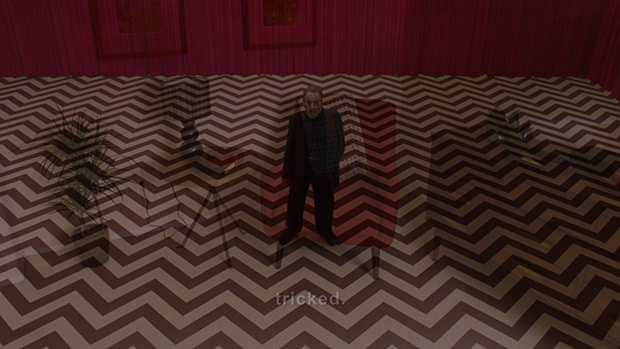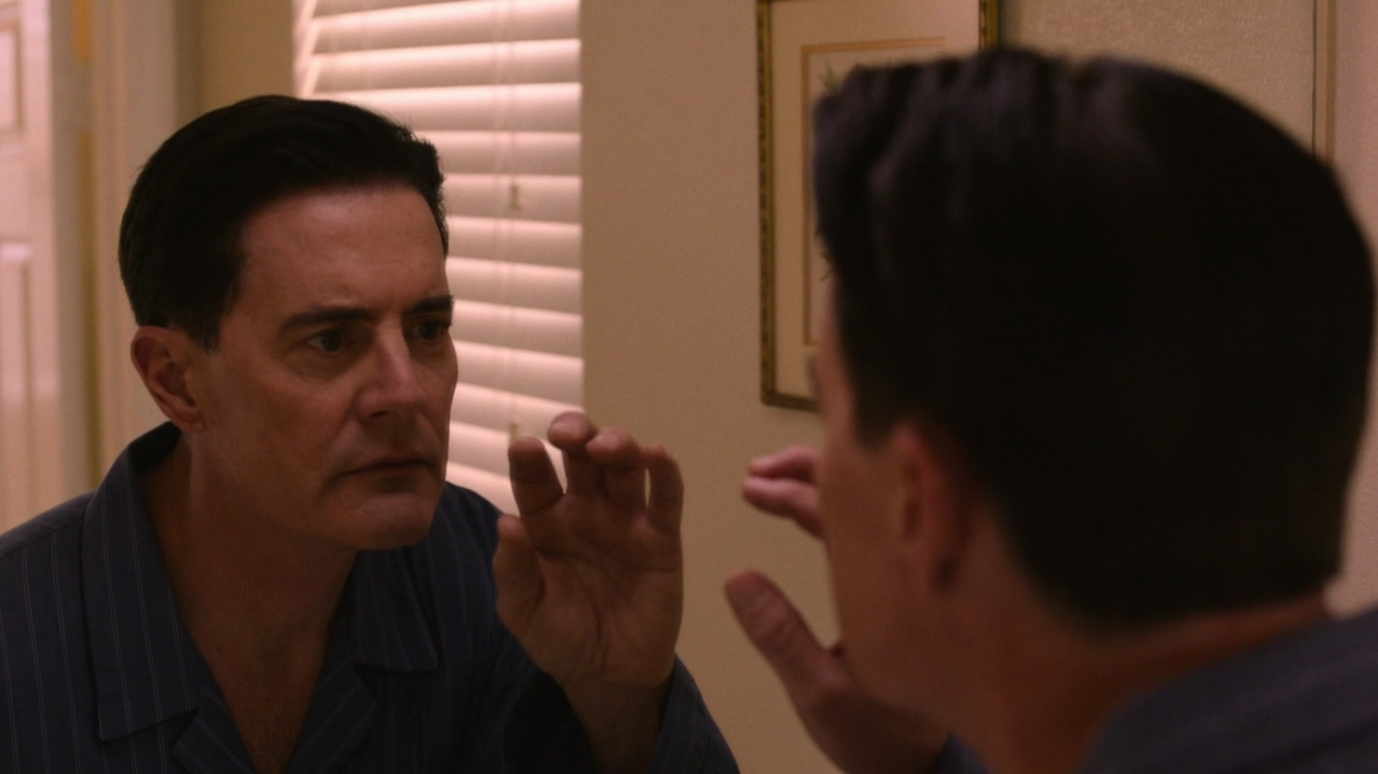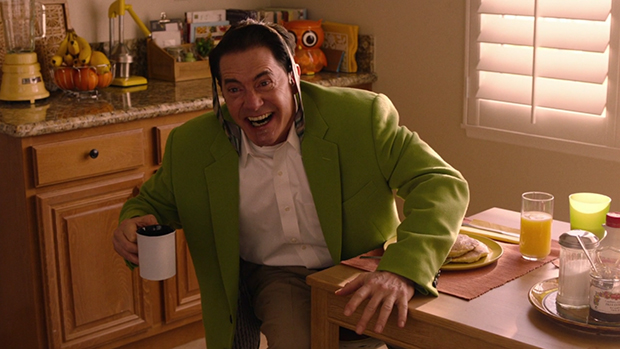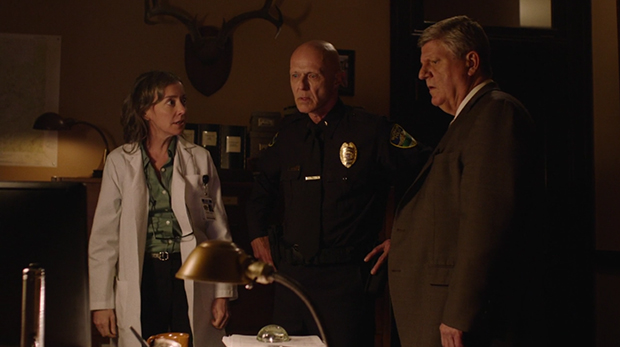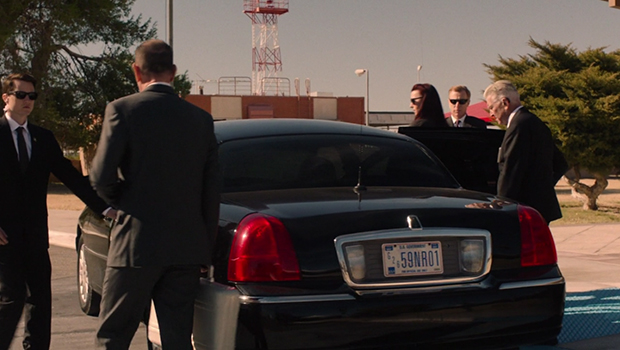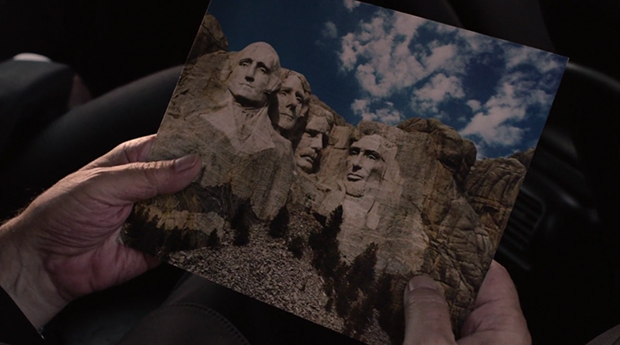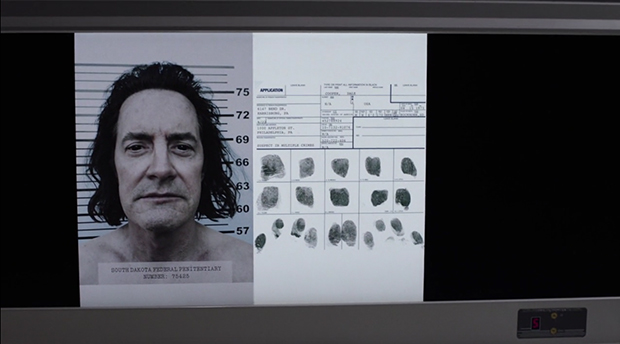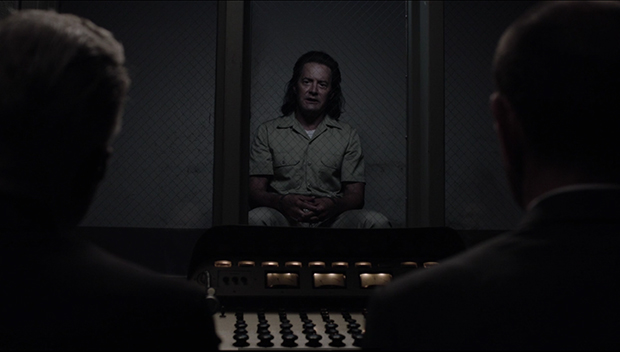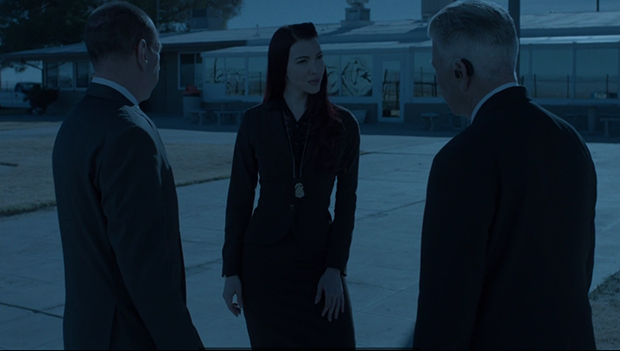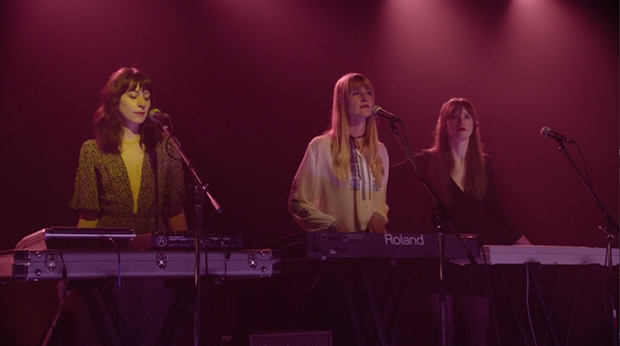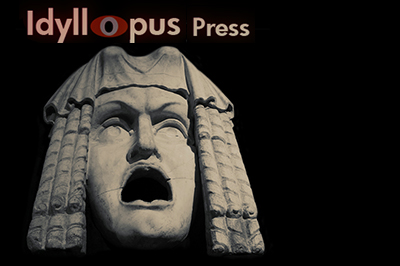TWIN PEAKS: THE RETURN

Go to Twin Peaks Table of Contents for a note on the analysis.
PART FOUR
TOC and Supplemental Posts | Part 1 | Part 2 | Part 3 | Part 4 | Part 5 | Part 6 | Part 7 | Part 8 | Part 9 | Part 10 | Part 11 | Part 12 | Part 13 | Part 14 | Part 15 | Part 16 | Part 17 | Part 18 | Films Home
LINKS TO SECTIONS OF THE ANALYSIS ON THIS PAGE:
THE HOUSE WITH THE RED DOOR - Reversed shots/ Symbolism connecting one-armed bandits and gum and the liberty bell / American dreams / The allied chemical man points before a purple flower / Portrait of Howard Hughes in 1946, the year of his accident / The mustache of Howard Hughes / We're watching you / Lancelot and Merlin and Cooper-Dougie's home / Happy Birthday! / The coincidence of Cooper, who was likely supposed to be Douglas Milford's replacement twenty-five years beforehand, instead replacing another Douglas
DENNIS>DENISE - Camelot and Kennedy / Sideline plots with no explanation and background and how they add substance / Roses and lilies.
BRINGS BACK SOME MEMORIES - The Observer Effect and Heisenberg Uncertainty Principle / Lucy's problem with cell phones / Far away and breaking up / The previously unobserved Twin Peaks behind Twin Peaks / Revivifying the soap opera DNA of the show / Lewis and Clark / My shadow is always with me / Dharma
WALLY BRANDO AND THE DEVIL AND DANIEL JOHNSTON
TRICKED - Mirroring / Tricked / Sonny Jim's response to Dougie-Cooper /Take five / A second owl / I am Dougie's Coffee
ACCESS DENIED - Our timeline begins to fall apart
FACES OF STONE - Mount Rushmore, Lincoln, and faces of stone / Tammy's car sickness and Mr. C's / Up on the wrong side of the bed
I WAS A LITTLE BIT BEHIND SCHEDULE WHEN MY CAR VEERED OVER ACROSS THE ROAD AND I HAD MY ACCIDENT - The shared birthdate with Bill Hastings / 9-22 / Inability to reconcile inconsistencies and apparent errors in the mug shot info / The thumbs up / Yrev / A stony facade / The accident
I KNOW WHERE SHE DRINKS - The blue cast to the scene / Tammy's wire / Albert, Albert, Albert / Why did Albert no tell Gordon about Jeffries and Cooper / The accident
THE BANG BANG
STAB AT A TIMELINE
THE INTRO CREDITS
As in part two. See that part for description.
THE HOUSE WITH THE RED DOOR
REVERSED SHOTS / SYMBOLISM CONNECTING ONE-ARMED BANDITS AND GUM AND THE LIBERTY BELL / AMERICAN DREAMS / THE ALLIED CHEMICAL MAN POINTS BEFORE A PURPLE FLOWER / PORTRAIT OF HOWARD HUGHES IN 1946, THE YEAR OF HIS ACCIDENT / THE MUSTACHE OF HOWARD HUGHES / WE'RE WATCHING YOU / LANCELOT AND MERLIN AND COOPER-DOUGIE'S HOME / HAPPY BIRTHDAY! / THE COINCIDENCE OF COOPER, WHO WAS LIKELY SUPPOSED TO BE DOUGLAS MILFORD'S REPLACEMENT TWENTY-FIVE YEARS BEFOREHAND, INSTEAD REPLACING ANOTHER DOUGLAS
Before I get into this, we have a couple of flipped/reversed shots in this section that I'm going to go ahead and point out. Shot 4 shows a scene of coins spilling out obviously reversed, with a numeral 3 observed in reverse. The shot showing the 3 in reverse is of especial interest as we already have in the glass box scene in New York, the second time that Sam is changing out the SD card, a flip in orientation concerning the #3 camera. First Sam is shown changing the card in the camera opposite it, then he is shown changing the card in the #3 camera, then he is shown changing the card in the other camera.
Shot 4 is later shown in proper orientation in shot 18.
Another reversed shot is 16 with Jackie running in with the buckets. Because the M and the horseshoe and dice on the bucket looks so similar reversed, one isn't going to notice. A Black Panther machine is on the left and a White Diamonds machine is on the right. This same location is also seen in the casino section in part three but in proper orientation. In part three, Cooper-Dougie heads through it to the BigPayDay machine.
All "Hello" shots actually take place in front of the BigPayDay slot machine with the Tropical Treasure one to the left, but the orientation for this is sometimes reversed and we also see a different machine being played. Shot 22 shows Cooper-Dougie in proper orientation before the BigPayDay machine with the Tropical Treasure on the left. Shot 23 shows him getting the jackpot 888 on another machine. Then shot 24 shows a reversed orientation before the BigPayDay machine and we see the Tropical Treasure on the right.
Because of viewing over and over again the symbols coming up in matching 3s on the machines, it occurred to me to look up the history of these symbols.
"By 1910, in an effort to camouflage the gambling aspects of the Bell, Mills substituted symbols that theoretically promoted the varied flavors of the branded Bell Fruit Gum discharged by a vending attachment, or paid off over the counter. The fruit symbols soon became inseparable from the basic machine, forming a united design integrity all its own that made the symbols of the machine as readily recognizable as its form and substance. The Mills firm took the step of copyrighting their symbols, getting them legally recognised in 1910 (and carrying that copyright date on their fruit reels until the 1940s), with both Caille and Watling attempting to establish their own. But in the end it was the fruit on the Mills models, and specifically the Bell-Fruit-Gum bar symbol. that became the totems of the automatic payout slot machine, with some of these pieces of art surviving on slot machine reels to this day." Source: Richard Bueschel book "Lemons, Cherries and Bell Fruit Gum".
"That gum you like is going to come back in style." Of course, I think about this.
The bell of Bell Mills was the Liberty Bell, the original slot machines being the Liberty Bell. I think back on the image of the Liberty Bell that Lynch has previously used in connection with the Phillie FBI offices, specifically the scene in which Cooper doubles when Jeffries shows up after a lengthy absence, and even asks, referring to Cooper, "Who do you think that is?"
When does the FBI come into play in part three but immediately after Cooper-Dougie's playing slots at the casino.
Of course, one may draw a parallel between the one-armed-bandits (slot machines), the arm, and the one-armed man, Phillip Gerard/Mike.
(1) About 1:39. An establishing shot of Vegas (2) followed by one of the Silver Mustang Casino at night. The upper floors are colored with green lights that transition to purple with the lower floors, and in the middle the gold sign of the upturned horseshoe enclosing an M. We should perhaps consider how "chrome" and green seem to be connected with the transition of the immaterial into the material world in the Lynch/Frost universe (see part two and the discussion of this under the Chromatics) and that Jacoby's purple world (his red and blue glasses) is believed by him to be a more true apprehension of the world with the balancing of the logical and intuitive (see again part two and the discussion on Jacoby's glasses).
It seems, at least in Vegas, it is still Monday. We hear alarms blaring.
(3) Cut to a security guard, Warrick the pit boss (David Dastmalchian), and Burns (Brett Gelman), the supervisor, standing together, looking on in stunned amazement. Then a number of shots of the one-armed-bandits, (4) the first one a flip-reversal of coins spilling out of a machine, so that we see 3 in reverse and BLANKBLANKBLANK in reverse.
It may be that people will associate such reversed shots with the Red Room and its reverse speech.
(5) A shot of another machine in regular orientation, "Charge" trumpets blaring, (6) Cooper-Dougie yells, Hello!", (7) coins pour out of a SPARKLERS machine, (8) whir to (9) Cooper-Dougie pulling another lever, (10) closer shot of the machine, (11) money pouring out, (12) pan whir, (13) the pulling of a lever, (14) triple 8 jackpot, (15) and the pouring forth of coins. (16) Jackie runs to assist with a number of buckets for the coins in another reversed shot, so we see a person playing a WHITE DIAMONDS machine reversed.
(17) Cooper-Dougie pulls the lever on a triple 7 machine. (18) More coins flood out in a repeat of shot 4 though this time in proper orientation.
(19) whir, (20) Jackie runs with buckets to turn in circles before a BIGPAYDAY and TROPICAL TREASURE machine as she looks for Cooper-Dougie, "Charge" fanfare blaring again. This is a very similar shot to the one in part three in which Cooper-Dougie rises from this seat, viewed from above, and turns circles in a confused manner, wondering which way to go.
(21) "Charge" fanfare as we have a close-up of Cooper-Dougie dropping in coin, (22) he calls out, "Hello!".
(23) A triple 888.
(24) Another "Hellooooo!".
(25) The triple 888 spilling forth more coins, (26) the American slots machine, (27) more coins and crossfade to two security guards, Jackie, Burns and Warrick all standing together staring on.
BURNS: How many jackpots?
JACKIE: So far, 29 mega jackpots.
BURNS: I'm dead.
(28) Another whir pan, (29) and the elderly Lady Slot-Addict approaches Cooper-Dougie and pats his jacket. "Mr. Jackpots, Mr. Jackpots. Tell me which one." (30) He sees the Red Room guide light above a triple 8 machine and (31) points her to it. (32) Cooper-Dougie. (33) She runs to the machine. (34) Rear shot of her going to the machine. (35) Cooper-Dougie leans to his right to (36) point her to the correct one. (37) He nods in agreement she is at the right one. (38) She nods. (39) He watches. (40) Her 888 machine located between a VICTORY and AMERICAN DREAM machine, she gets a jackpot and jumps up and down. (41) "Now thirty," Jackie says. (42) The old woman turns to Cooper-Dougie. "Thank you, Mr. Jackpots! Thank you! Thank you!" (43) He responds emotionally, smiling, pleased with her joy. (44) The old woman. (45) Cooper-Dogie. (46) The old woman continuing to thank him. (47) Cooper-Dougie.
(48) A side view of Cooper-Dougie. (49) A man holding a hot dog approaches, saying, "Dougie, Dougie, is that you? It's Bill Shaker. Allied Chemicals. What, are you taking a walk on the wild side?" He has with him a blond woman in red sequins. She is Candy (Sara Paxton).
SHAKER: Bill Shaker.
(50) COOPER-DOUGIE: Bill Shaker.
(51) SHAKER (taps his chest): Dougie Jones.
(52)
COOPER-DOUGIE (making a connection, realizing his name): Dougie Jones.
(53)
SHAKER: Yes, I'm Bill Shaker and you're Dougie Jones. Man, Dougie, can I say you look like a million bucks. What is it, the diet? New haircut? Oh. (54) Notices Dougie staring at his hotdog. (55)SHAKER: Sorry. I'm really hungry. I haven't eaten since breakfast at home.
(56)
COOPER-DOUGIE: Home.
(57)
SHAKER: Sorry, I don't get it, Dougie.
CANDY: You want to go home, Dougie? Is that right? (58) Cooper-Dougie. (67) CANDY: I think he wants to go home.
COOPER-DOUGIE: Home.
CANDY: Where is your home? Is that right?
SHAKER: He knows where his home is. Well, where is his home?
(59)
COOPER-DOUGIE: Where home?
(60)
SHAKER: Oh, my God. Lancelot Court. Your house has the red door. (61) Cooper-Dougie. (62) SHAKER: That's how I always find it. Near Merlin's Market? It's not far from here.
COOPER-DOUGIE: Far from here.
SHAKER: No, not far from here. It's maybe a six or eight dollar cab ride.
COOPER-DOUGIE: Cab ride.
CANDY: Something must have happened. Right, Dougie?
SHAKER: There's a whole line of cabs right out front.
CANDY: Are you okay? (63) Cooper-Dougie walks away.
(64) CANDY: Is he okay?
SHAKER: It was good to see you, Dougie! Gee, I hope he's okay.
CANDY: I don't think he's okay.
Throughout the conversation, a machine behind Bill and Candy has displayed a purple-violet flower that might remind one of the purple-lilac cloud by which Cooper had fallen into the purple world.
In the original series, the Giant had told Cooper that "without chemicals, he points" would come true. The one-armed man proved to be the one that, when deprived of his drug that repressed Mike, "pointed" by telling Cooper the story of his partnership with Bob. Now, in a place of one-armed-bandits, Shaker, from Allied Chemicals, supplies Cooper-Dougie his last name and also points him to home. Not having for now a personal ego to get in the way with self-devised plans--copying what others do and say, following what stands out to him (signs)--Cooper-Dougie keeps landing in the right space at the right time to pick up information to protect and guide him on his way. His knowledge that this is happening is absent.
In Blue Velvet, Allied moving vans had been parked before the apartment building Frank lived in that was in an industrial area. At that building, the Yellow Jacket Man (a crooked detective, who dressed a little like Dougie) was shown meeting the Well-Dressed Man who was Frank in disguise. .
(65) Leaving his winnings behind, oblivious to the meaning of money, still carrying his white cup with the M logo of the casino, Cooper-Dougie heads toward the front of the casino to find a cab. He believes his name is Dougie Jones, but what is a name to him? The concept of home means nothing to him at this point. He repeated the word and has thus been pointed in its direction, and as that was the direction in which he was pointed he goes there. Jackie pursues him yelling, "He's here! He's leaving!" Warrick pursues and catches him, saying, "Excuse me, sir? Hi. Can you please come with me? We'll go this way." He directs him to left screen past the cashier's, Meg Foster no longer behind the bars.
(66) Cut to Burns' office, Burns at his desk, obviously distressed, gripping his throat as though he is afraid he is going to be strangled. (67) Warrick directs Cooper-Dougie in (68) to see Burns, (69) and, behind Cooper-Dougie, twirls a finger at his temple indicating that Cooper-Dougie isn't all there. (70) Burns. (71) Warrick seats Cooper-Dougie. (72) Burns. (73) Cooper-Dougie. (74) Burns picks up a big bag of money and plops it on his desk.
(75) We see on the wall behind Dougie an oversized picture of a man. It's Howard Hughes in 1946, the year that he was nearly killed in the crash of an XF-11, a U.S. Army Air Forces reconnaissance plane, in Culver City, California. Thereafter he wore a mustache to disguise a facial injury.
Two other large portraits have been of Kafka, and could possibly refer to "The Metamorphosis".
Bill Hastings' ID shows him with a mustache but he doesn't have one in the show.
(76)
BURNS: You weren't going to leave without your winnings, were you, sir.
(77)
COOPER-DOUGIE: Sir.
(78)
BURNS: Is there anything we can do to help?
(79)
COOPER-DOUGIE: Call for help.
(80)
BURNS: Call who?
(81)
COOPER-DOUGIE: Who?
(82)
BURNS: Well, we'd certainly like to help you. Would you like a room? (83) Cooper-Dougie looks at the oversize red dice on the desk. (84) BURNS: Good meal? A drink? A little companionship? On the house. (85) Cooper-Dougie. (86) BURNS: Think of us as a home away from home.
(87)
COOPER-DOUGIE: Home.
(88)
BURNS: And do you live around here? Where is your home?
(89)
COOPER-DOUGIE: Lancelot Court. Cab ride.
(90)
BURNS: Oh, no, no, no. No cabs. What's your name, sir?
(91)
COOPER-DOUGIE (points to himself): Dougie Jones.
(92)
BURNS: Limo for Mr. Jones.
(93)
WARRICK: Smithie, bring a limo around front, please.
(94) Burns places Cooper-Dougie's bag of money in the center of the desk, (95) as Cooper-Dougie watches, and (96) shoves it toward him. (97) Cooper-Dougie gently approaches and (98) shoves the money back, mirroring him. (99) Burns rises slowly (100) and Cooper-Dougie does as well, mirroring him. (101) Burns stares at Cooper-Dougie (102) who stares back.
(103) BURNS: But you have to promise me something. He leans in to Cooper-Dougie (104) who also leans in. (105) BURNS: You'll come back and try your luck with us again. (106) Cooper-Dougie. (107) BURNS: Soon. Anytime. Day or night.
(108)
COOPER-DOUGIE: Or night. (109) Burns. (110) Cooper-Dougie.
Cooper-Dougie has been reacting to Burns as to a mirror.
Now Cooper-Dougie hears a whirring and looks up at (111) the camera eye in the ceiling.
The viewer's eye had been already directed to the house surveillance in part three by the old, disheveled woman playing slots. When Cooper-Dougie had walked away from his winnings, she had looked at the pile of coins and it was obvious the thought of taking some of the money had passed through her mind. However, she was well aware of house surveillance and had looked up at the camera eye and shot a bird at it, peeved.
(112) Cooper-Dougie. (113) BURNS: That's right. We're watching you, Mr... (114) Cooper-Dougie. (115) BURNS: ...Jones.
(116) Cut to Cooper-Dougie in a limo being taken home.
(117)
LIMO DRIVER: We're on Lancelot Court. You don't know your address? Just a red door?
(118)
COOPER-DOUGIE: Red door.
(119)
LIMO DRIVER: The thing is, it's hard to see the color at night.
(120) A view of the houses on the passenger side of the street. (121) The driver from the rear. (122)
COOPER-DOUGIE: Red.
(123)
LIMO DRIVER: No. That's black. Like I was saying, it's real tough to see the color at night, so... (124) Cooper-Dougie. (125) LIMO DRIVER: ...there it is. There's your door right there, Mr. Jones.
The address is 25140.
(126) Fortuitously, the porch light is on, guiding Cooper-Dougie home. It wasn't hard at all to locate the red door because of this. (127) Cooper-Dougie. (128) The limo driver parks (129-131) and patiently, gently assists Cooper-Dougie out of the car, when he doesn't respond to, "Mr. Jones, Mr. Jones, Mr. Jones." (132) The red door. (133-134) When Cooper-Dougie simply stands and stares at the door, the driver says, "All right, all right, I'll wait right here with you."
(135-137) An owl hoots and flies overhead, reminding that "the owls are not what they seem". The driver tells Cooper-Dougie, "Those things spook me." (138) The front door opens and Janey (Naomi Watts), Dougie's wife, emerges.
JANEY: Dougie? Is that you? Dougie! (139) He points to himself. (140-143) She advances toward him and slaps him. JANEY: Where have you been? What is this?
(144-145) LIMO DRIVER (explaining and bowing out of a personal scene): Ma'am. He was a guest at the Silver Mustang, on his own, and I was asked to bring him home. I'll be going now.
(146-150) Janey and reaction shots from Cooper-Dougie. JANEY: Three days without a word. You don't show up at work. And you miss Sonny-Jim's birthday! How could you? Get inside!
(151-152) She pushes him inside as the limo drives off (153-154) and shoves him into a seat at the dining table, the dining room still filled with birthday balloons. The balloons bring to mind the red balloon at the house of the drugged mother and son on Little Rock. With the condition his mother was in, it's doubtful that the little boy was at Sonny-Jim's birthday party and came home from it with a balloon. It is a possibility but highly unlikely. Instead, the balloons in both homes could be simply asking us to mark the contrast between the households.
(155) JANEY: What have you been doing? Huh? Why didn't you call me? Where'd you get that black suit, and that haircut, Dougie? (156-1457) She grabs the bag from him. JANEY: What's in this bag, huh? (158-160) She opens the bag and sees it's full of cash. JANEY: Dougie? Dougie. Dougie, there's thousands and thousands of dollars here. (161) He mutely gazes at the table lamp. (162-166) Janey and reaction shots of the inexpressive Cooper-Dougie. JANEY: Where did you get this? Did you get this at the Silver Mustang? Huh? Dougie? Don't tell me you hit the jackpot.
(167) COOPER-DOUGIE: Mr. Jackpots.
(168-170) JANEY: You won it? Dougie? Well, there's enough here to pay them back. The, you could, we could, oh, oh...this is the most wonderful, horrible day of my life.
(171) COOPER-DOUGIE: Of my life.
(172-176) JANEY: Yes. I'm gonna fix you a sandwich, and then I'm going to get you a piece of Sonny-Jim's chocolate cake because we saved a piece for you. Ok, Dougie? I'm so glad you're home, Dougie.
She kisses him on the forehead (177) and goes into the kitchen. "Home," Cooper-Dougie says.
Dougie's home being on Lancelot Court not only brings in Glastonbury Grove, via King Arthur, but forms a connection with the Rancho Rosa suburb where Dougie was with Jade, as driving down Little Rock they had passed by Sycamore, connecting with the circle of sycamores at Glastonbury Grove near Twin Peaks, where is an entrance to the Black Lodge.
The story is that, as a child, Lancelot had been carried off by the Lady of the Lake who raised him in a magical kingdom. Sent then to become a knight in King Arthur's court, he fell in love with Queen Guinevere. He is known only as the White Knight until he is the one who is able to lift a metal slab that will have under it the name of the knight who can lift it, which is when he discovers he is Lancelot. The daughter of the Fisher King tricks him into thinking she is Guinevere, sleeps with him, and becomes pregnant with Galahad. For this, Guinevere banishes him from the court and he goes mad, wandering in the wilderness for two years. Elaine, the Fisher King's daughter, finds him and shows him the Holy Grail through a veil, curing him. He was not able to view the grail directly as he was not pure enough. He returns to court and quests for the Holy Grail, but it is his son who is able to drink from it. Eventually, with the collapse of the court, Guinevere blames it on the adulterous relationship between herself and Lancelot.
Cooper's problem has often been related that he has a kind of White Knight complex, ever eager to rescue a woman in distress. Cooper is rather like Lancelot in that he didn't know his name and only discovered it after becoming Mr. Jackpots.
Three days since Dougie's disappearance suggests a death and resurrection. Coincidentally, Cooper's return comes at a time that is close to Sonny Jim's birthday. Sonny would typically connote "Jr", as in the father's name would also be Jim, or James. However, we don't have that here. The father is instead Dougie. Perhaps his full name is Dougie James Jones or James Dougie Jones?
Some lore behind a red door is that it can either mean a welcoming place for a traveler, a place of protection, or a home that is mortgage free. Though he was slapped by Janey, all of these may relate to Cooper-Dougie, who has brought home with him considerable wealth. However, before the murder of Darya at the motel we were shown it too had red doors and those red doors had not granted Darya any fortune as a traveler, no protection.
A question for the viewer will be why everyone who has come in contact with Cooper-Dougie has been cognizant of the fact something is wrong with him, yet his wife who seems unaware that anything is amiss with him.
Cooper-Dougie has been so gently treated by some of the individuals he's met, that it's a shock when Janey strides out and slaps him. He is surprised as well, and cowed by the way she drags him into the house and shoves him in a chair. But then, with her questions, we realize Dougie's likely a compulsive gambler who must owe a considerable amount of money to loan sharks, and so undependable as to have disappeared for three days. Who was Dougie, this clone of Cooper's, and what has he been up to? Janey's relief at the money he has brought home is such that she nearly cries. No more worries over the loan sharks.
The fact that Cooper-Dougie now has this pre-made life with Janey and Sonny Jim is a surprise to the viewer, but a nice surprise. There is a certain security, for the viewer, in Cooper-Dougie being presented with a home and family. Beyond this red door, for Cooper-Dougie, seems a place of rest and safety. Janey has saved cake for Dougie and is glad he is home. She makes him a sandwich. He will be fed. He will have a place to sleep. Plenty of questions come with this home, this family, but after a harrowing journey here is respite, at least for a time.
Cooper has experienced a lot of tragedy and loss. He's been effectively in prison, twenty-five years of his life stolen from him. There's something very nice in Cooper finding himself suddenly with a home and family.
Naomi Watts starred in Lynch's Mulholland Drive in which she played two characters in one. She is first a woman named Betty, who wins a jitterbug contest and arrives, starry-eyed, in Los Angeles. Her aunt is a famous actress, and Betty is convinced she will become a star. Later in the film she is Diane, a woman well on her way to being down-and-out, whose spirit and dreams are busted and behaves in a manner totally contrary to Betty, to such an extent that she hires a hit man to kill a former lover. In the end, she commits suicide. The viewer is never quite confident what has happened with Betty/Diane, only that they are somehow the same individual. Before she commits suicide, Diane is terrorized by the figures of an elderly couple who had welcomed Betty to Hollywood, they seeming to represent promise turned into mockery when dreams of success are replaced with failure and abject despair.
Dougie Jones. It's too coincidental that Cooper takes the place of a man named Dougie. In part one I noted:
The in-the-meanwhile story about Garland Briggs is in Frost's The Secret History of Twin Peaks. He had a meeting with Cooper, on March 27th, 1989, after Cooper's having left the Red Room. Briggs had been selected by a Colonel Doug Milford to serve as his replacement at a secret facility, near Twin Peaks, that was called Listening Post Alpha (LPA). Milford had told Briggs, "I'm the white rabbit, drawing you closer to the rabbit hole. And like the rabbit, I'm late for a very important date. You're my replacement, Garland. You're going to become the Watcher in the Woods." The mission was to "detect signs of intelligent nonhuman life not only in deep space" but on earth. Colonel Milford was Briggs "control". When Milford died in March of 1989, at the same time Briggs found himself supernaturally abducted, during which he had an intense life-altering experience. Upon his return, he found Milford had died three days earlier and left him a message, that he was not to act alone but wait for his new control to appear. Briggs had determined it must be Cooper, for which reason he'd arranged the March 27th meeting with him. After that meeting he was concerned that something was wrong, he'd misinterpreted, and stated he was going to LPA to send out a Mayday signal.
Dougie Jones was "manufactured", therefore it could be meaningful that Dale Cooper, who Briggs believed was supposed to be his new contact, replacing a deceased Douglas (Doug, Dougie) Milford, has instead replaced Dougie Jones.
DENNIS>DENISE
CAMELOT AND KENNEDY / SIDELINE PLOTS WITH NO EXPLANATION AND BACKGROUND AND HOW THEY ADD SUBSTANCE / ROSES AND LILIES
(1) Back to FBI headquarters. Bill Kennedy (Richard Chamberlain) shows in Gordon Cole to the Chief of Staff's office. He tells him that the Chief of Staff will be with him in a moment, to which Gordon shouts, "Where is she?"
KENNEDY: She's in a meeting. She's just finishing up.
GORDON: Okay, Bill. How's Martha?
KENNEDY: Oh, she's fine. Thank you, Gordon.
GORDON: She ever fix that thing with Paul?
KENNEDY: Ah, yes, yes, yes, yes. Good of you to remember. Paul is now in the North Pole.
GORDON: Well, there you go!
KENNEDY: Please, have a seat.
GORDON: Thank you, Bill.
We've just left Lancelot Court with its allusions to Camelot, and now Camelot is recalled in Bill Kennedy, President J. F. Kennedy's time in office known as Camelot.
I could swear, by the way, that I've heard this joke before in a series, but instead the person was sent to Antarctica. The side plot of Martha and Paul is likely one of those we will never hear anything more about but adds a little humor and substance without explaining or providing background. The lack of explanation and background creates an open door for imagination to wander and wonder. Normally, such would be cut out as extraneus and inessential.
Kennedy exits after having shown (2) Gordon to his seat. (3) Gordon notices on the seat next to him a bouquet of red roses and lilies. (4) Gordon. (5)
Denise Bryson, formerly Dennis (David Duchovny) enters.
(6) Gordon rises. GORDON: Denise.
(7) DENISE: Gordon. Thank you for coming in. What have you got?
(8) GORDON: It's Cooper, we found him.
(9) DENISE: Where?
(10) GORDON: South Dakota, Denise. He's in a federal prison in South Dakota. We're going out to see him tomorrow.
(11) DENISE: I heard.
(12) GORDON: Yes? How's that?
(13) She sits. DENISE: You're taking Agent Preston with you?
(14) GORDON: Yes.
(15) DENISE: Really, Gordon?
(16) GORDON: What are you getting at, Denise?
(17) DENISE: Well, I know your profile, Gordon. Beautiful agent, barely 30.
(18-28) Gordon and Denise reaction shots. GORDON: I'm old-school, Denise. You know that. Before you were Denise, when you were Dennis, and I was your boss, when I had you working undercover at the DEA, you were a confused and wild thing sometimes. I had enough dirt on you to fill the Grand Canyon, and I never used a spoonful because you were and are a great agent. And when you became Denise, I told all your colleagues, those clown comics, to fix their hearts or die.
(29) DENISE: Yes, and as I've said many times before, Gordon, I can never repay you enough for that kindness.
(30) GORDON: Agent Tammy Preston has the stuff, Denise.
(31-33) DENISE: I know, I know. I'm speaking more as a woman now than as the Chief of Staff of the entire Federal Bureau of Investigation. Don't you just love sometimes saying "Federal Bureau of Investigation" like that all at once? Unabbreviated? Oh, it just gives me such a thrill.
(34) GORDON: It is thrilling, Denise.
(35) DENISE: And, Tammy. Tammy is so beautiful.
(36) GORDON: There's room in this Federal Bureau of Investigation for more than one beautiful woman.
(37-45) Denise and Gordon reaction shots. DENISE: Oh, Gordon. That is so sweet. You know, normally, I can't think like this. I have to forego all that and grow balls of steel to do this job, and it's, it's a bitch, let me tell you, sometimes. Not to mention the screaming hormones. Oh, I know, I'm sorry, Gordon. I know. Gordon, I trust you, you know that. And I believe you're on the trail of something big.
(46) GORDON: Big.
(47) DENISE: Will Albert be with you?
(48) GORDON: Do birds fly?
(49) DENISE: Good luck.
(50) GORDON: Ten-four, good buddy.
(51) They shake hands. (52) Kennedy enters to show him out. Gordon thanks Kennedy and Kenney replies, "Please, come along." (53) We get another look at Denise who waves her hand at her face, as if cooling herself and those hormones down.
Did Tammy Preston also have a meeting with Denise just before this? Is that how Denise knows that Tammy is going with Gordon? My first impulse is to take it that Denise has some sort of a relationship with Tammy, which is how she found out that Tammy was going with Gordon, and that the roses on the seat are perhaps Denise's signal to Gordon of that relationship.
Richard Chamberlain's appearance is a nice surprise, a little odd however in that it concerns such a small role with only a couple of lines, him showing Gordon in and out of Denise's office. I've wondered if Chamberlain might have been pulled in due to Peter Weir's The Last Wave, in which Chamberlain, acting as a lawyer for Australian aboriginal men accused of murder, has a premonition and becomes drawn into the concept of Dreamtime, learning all is not as it seems. His having been in The Last Wave at least nicely complements Hawk's current dilemma of having to find something "missing" in a manner that has to do with his American Indian heritage, as well as Lynch's dreamtime theme.
Dennis>Denise reappearing brings back in a trace of paranormal X-Files connection that David Duchovny brought to the original series. X-Files and Twin Peaks were by no means two peas in the same pod, but the two shows would have shared some viewers.
We have had earlier some male/female gender-bending or ambiguity. In keeping with metamorphosis, Denise continues down this vein. In the original series, Dennis' storyline had him first cross-dressing for an FBI case, discovering he was more comfortable as a woman, and deciding eventually to transition. I've read that Lynch was fascinated by Ed Wood's cross-dressing film Glen or Glenda and that it somehow played a part in the inspiration of Eraserhead.
Lynch's films are all occupied with the ambiguity of identity, many characters hiding chunks of their lives and selves, living in several different worlds in which friends, family and associates don't connect, each allotted to their own sphere. From what Lynch has said, this is also how he handled his youth, in high school.
BRINGS BACK SOME MEMORIES
THE OBSERVER EFFECT AND HEISENBERG UNCERTAINTY PRINCIPLE / LUCY'S PROBLEM WITH CELL PHONES / FAR AWAY AND BREAKING UP / THE PREVIOUSLY UNOBSERVED TWIN PEAKS BEHIND TWIN PEAKS / REVIVIFYING THE SOAP OPERA DNA OF THE SHOW / LEWIS AND CLARK / MY SHADOW IS ALWAYS WITH ME / DHARMA
(1) It is still night. The exterior of the Twin Peaks Sheriff's Department.
(2-6) Interior. Lucy's on the phone, sitting before the thermostat. She wears the same pink sweater as in part three, suggesting it is the same day, Monday.
LUCY: Well, it has to do with the thermostat. It doesn't actually tell you what's going on when no one's here. Uh, mostly, we don't have prisoners, but even if we did they couldn't even see the thermostat. So, I had a man out here recently to look at the furnace, and Sheriff Truman, he wouldn't answer any of my questions about what happens when no one's here. We come in early, and the heat is still on. What if we came in even earlier? Would the heat still be on then? Are you next to a loud stream, Sheriff Truman? You're breaking up. Are you still fishing? Are you next to a really loud stream? You're breaking up, Sheriff. Well, I hope we can get this sorted out when you get back to the office... (7) Sheriff Truman enters, holding up his iPhone, Lucy's back to him. (8) LUCY: ...but right now it's very comfortable in here. I have to go, Sheriff Truman, because there are some people coming in through the front door.
(9) Lucy turns and sees Sheriff Frank Truman.
The last scene had Denise speaking about hormones, which she assumed Cole didn't want to hear about, and then showed her fanning her face as if cooling herself. The thermostat, which controls heat, must connect with this.
(10) Lucy is so shocked to see Frank that she screams and flies comically backward in her chair.
There are other things going on here, but, for those who don't know that Sheriff Truman would have been expected to be Harry Truman from the original series, but we have instead a Frank Truman in The Return, perhaps Lucy is playacting for the long time viewer their own surprise. This is Sheriff Truman? Why, this isn't Harry! Even though the viewer was warned by Lucy, in part one, that there were two Sheriff Trumans, and that one was out fishing and the other was sick, those who hadn't heard the news in the media about the new Truman would be surprised to see Frank (Robert Forster) rather than Harry (Michael Ontkean). In that scene in part one, the viewer was as the insurance salesman wanting to see Sheriff Truman, but Lucy insisted upon which one, that it would make a difference, and the insurance salesman was helpless to reply which one as he didn't know. The viewer who had no knowledge of there being two Trumans, and which one was sick and which one was fishing, was as helpless to make a choice. The viewer simply wanted Sheriff Truman, expected the old Sheriff Truman. Instead, Lynch hands them a new one, much in the way that the viewer has been handed a new Cooper in the form of Dougie-Cooper.
(11) ANDY (rushing to check on her): Lucy! Lucy! You were on the phone again with her, weren't you?
(12) FRANK: Andy, I'm sorry. We lost connection. I couldn't stand out in the parking lot all night.
(13) ANDY: I hate cellular phones.
(14) LUCY (looking up and seeing Truman): How is this possible?
(15) TRUMAN (exiting): Lucy, hang up the phone.
(16) LUCY: But you're in the mountains...fishing!
(17) Frank exits turning right down the hall.
(18) ANDY (kisses her): Oh, punky. Punky.
This has been apparently a long-standing problem with Lucy, and I'm not confidant it's an inability to move with the times, to grow into new technology (though Lucy may partly represent the desire on the part of some viewers to have Twin Peaks exactly as it used to be, to not change) as much as Lucy being used to communicate information to the viewer in a particular way. Lucy had raised the question of the two Trumans, and that which Truman a person identified as the one wanted would "make a difference". Now she is concerned with observation. There are no prisoners in the jail so there are times when the premises are vacant of people. What happens when there is no observer? Some will see perhaps a linkage with the idea of the observer effect, that phenomena is impacted by observation. This has been confused with Heisenberg's uncertainty principle, and Heisenberg used such an observer effect at the quantum level as a physical explanation of quantum uncertainty (Wikipedia).
It has since become clearer, however, that the uncertainty principle is inherent in the properties of all wave-like systems, and that it arises in quantum mechanics simply due to the matter wave nature of all quantum objects. Thus, the uncertainty principle actually states a fundamental property of quantum systems, and is not a statement about the observational success of current technology. It must be emphasized that measurement does not mean only a process in which a physicist-observer takes part, but rather any interaction between classical and quantum objects regardless of any observer.
Source: Wikipedia
Heisenberg did, in fact, make an appearance in "The Path to the Black Lodge" episode in the original series. In it, Cooper, at the Double R Diner, leads off a conversation with Annie by quoting Augustine, "Hear the other side, see the other side." He expresses his attraction to Annie, saying that he's involved in a complicated investigation but spends most of his time thinking about her. She tells him she's been seeing his face in fried eggs all morning. They discuss scientific findings that there is a chemical basis to attraction, Annie asking "is that what it is", and Cooper says it's hard to comprehend without perspective. They talk a little more and Cooper tells Annie they are very much alike, then says they think too much.
ANNIE: What we observe is not nature itself, but nature exposed to our method of questioning.
COOPER: Heisenberg.
They make a date for Cooper to teach her dancing that evening. They kiss, there is a crash, and we see behind the counter dirty dishes brokenon the floor in a peculiar place for them to be as they'd not fallen off the counter. Atop is a cup of coffee tipped just enough that coffee spills a little over the lip of the cup. A close-up shows the coffee dripping so slowly it is like syrup, then becoming even slower.
Two episodes later, in the final episode of the season, The old waiter brings Cooper a cup of coffee in the Red Room, at which point he is replaced by the giant who states, "One and the same." When Cooper at first tips the cup the coffee appears to be congealed then he tips it again and the coffee freely flows. The viewer sees Cooper as moving normally, and Cooper sees himself as moving normally, but time in that cup of coffee is moving so slowly relative to Cooper that he is unable to see any change in it. And then it does move normally relative to what he expects. The slow-motion, syrupy way in which the coffee was dripping in the pile of broken dishes, back at the diner, anticipated this happening in the Red Room.
We have seen this freezing in time, relative to what is expected, in certain scenes such as in part three in the Red Room with Phillip Gerard, when he appeared frozen and then would move. And, indeed, as Lucy flipped back in her chair, in surprise at seeing Frank, the speed seemed comically sped up?
Lucy's conundrum is she was listening to the sheriff on the phone, and as far as she is concerned he must be in a fixed place--somewhere out there fishing. He begins breaking up. Lucy thinks Sheriff Truman is far away, and then suddenly he is there, entering the sheriff's department. How did he get there so quickly? The sheriff is exasperated as he can't stand out in the parking lot all night, fulfilling Lucy's expectations that he must be at a fixed place rather than moving as he speaks to her.
If we go back to part one, when ??????? is speaking with Cooper, after telling him, "You are far away", there is a crackling static sound and Cooper breaks up, his presence glitches, he disappears in part then completely. Much the same as happened here with Frank. Lucy was on the phone with him and he was far away (as far as she was concerned), fishing, then their communication breaks up and suddenly he is there.
Now we are shown that the sheriff's department isn't at all what we have imagined it to be, expected it to be. We've only thus far seen Lucy's secretarial/receptionist area, Hawk's office, and the conference room. The conference room and the reception area were well known to us from the original series and are not exactly the same but are much the same. As it turns out, there is a whole back area, buzzing with activity, that we haven't seen, with all new characters.
(19) Cut to the active back office, which wasn't in the original series. We first see the dispatcher, Maggie Brown (played by Jodee Thelen). (20) Then we are shown a fuller view of the office in which are six other people.
MAGGIE: Eleven seventy-one. Fifteen oh-seven. Ten-four. Six ten. Ten oh-seven. Copy that. (21) Oh, hi, Sheriff.
FRANK: Evening, Maggie. What's going on tonight?
(22) MAGGIE: Kind of quiet. A domestic, two D&Ds, and a DUI.
(23-24) CHAD BROXFORD (played by John Pirruccello): I booked that one. Dude blew a .250. Could not even find his nose let alone touch it.
(25-26) MAGGIE: Oh, and it was terrible. A boy OD'd at the high school. Dennis Craig? Andy took the case. He spoke with the parents.
(27) FRANK: Little Denny Craig.
(28) MAGGIE: When the bell rang, he never got up from his desk.
(29) FRANK: Where's Hawk?
(30) CHAD: He's in the conference room.
(31) Frank and reaction shot of room. TRUMAN (exiting): Gents.
(32) Cut to Truman heading down the hall to the conference room, Bobby Briggs walking ahead of him, now revealed to be an officer.
FRANK: Bobby! Another apparent OD, little Denny Craig. Although I haven't seen the autopsy report, I'm guessing it was Chinese designer drugs again. Anything on your surveillance cameras?
BOBBY: Elk, deer, raccoon, squirrel, and a bear. If they're coming down from Canada in our area, I would've seen them. I got every trail covered.
FRANK: Every known trail.
BOBBY: Right. Frank, I got to take a leak so bad my back teeth are floating.
FRANK: Meet you in the conference room.
BOBBY: Good deal, sir.
The return of another old character, Bobby. And he's a deputy. Bobby was a pretty screwed up character in the original series, except that he loved Shelly and didn't want her abused by her husband, Leo. We wouldn't have expected him to become a deputy. However, there was once an affecting scene of good portend, his father, Major Briggs, breaking through their strained relationship, telling Bobby that he knew he would turn out all right. This was obviously touching and meaningful to Bobby.
We had Lucy's observation problem--what is going on if no one is there to see, including no prisoners. And now we have Bobby's problem in which he believes he has full observational powers on the US/Canadian border, that he would have seen if something was happening, but Frank points out that he is only observing every known trail. We had ourselves not expected the active back office. We thought we knew all about the sheriff's department, but there was much more going on behind the scenes.
(33) Cut to Andy with Lucy, who is upright at her desk again.
ANDY: Cell phones, that means they're mobile, Punky. The sheriff can be moving. It's not like your phone. He can be moving and even driving while he's talking. Lucy? You're so good at your job in every other way, I just don't understand how this keeps happening over and over again.
LUCY: I don't understand it either, Andy.
ANDY: You collect yourself. I've got to go see Sheriff Truman.
Andy exits and the camera holds a while on Lucy.
Andy left Lucy hurriedly, so one would expect him to quickly get to the conference room, and after he leaves the camera even holds on Lucy for quite a while, creating that space in time for him to reach the conference room. Yet, when Andy does enter the conference room he is immediately followed by Lucy, so that we feel a little off-kilter time-wise.
(34) The conference room. Hawk is speaking to Sheriff Truman as Chad enters.
HAWK: I know she seems like a strange one, but her information has always been spot-on.
(35-37) Hawk and Frank with cut-away shots of Chad.
FRANK: So Margaret says that something is missing having to do with Special Agent Dale Cooper and only you can find it because of something about your heritage.
HAWK: That's what she said.
(38-39) Andy enters. Reaction shot of Chad looking at him.
ANDY (entering): I'm here, Sheriff Truman.
(40-41) Truman then sighing reaction shot of Chad.
FRANK: Good, Andy.
(42-43) Lucy with silent reaction shot of Frank.
LUCY (enters): I'm feeling a bit better now, Sheriff Truman.
(44-45) Chad and reaction shot of Frank and Hawk.
CHAD: I thought that log woman was 10-96 and not even allowed in this building.
(46)
LUCY: That's on account of a kind of gum.
(47-48) Chad then indignant reaction shot of Andy and Lucy.
CHAD: Well, I'll chew on that.
(49-50) Frank then reaction shot of Chad.
FRANK: That's enough, Chad.
(51)
ANDY: She gets messages from her log.
(52-53) Chad then indignant reaction shot of Andy and Lucy.
CHAD: Pinocchio's friend.
(54)
FRANK: Goodnight, Chad.
(55-58) Chad, then Frank and Hawk, then Chad exiting past Andy and Lucy and a reaction shot of Frank and Hawk.
CHAD (exiting): I'll go have a word with my pinecone.
There's conflict with Chad. He doesn't respect the mystical as represented by Margaret and her log. In essence, he doesn't respect fundamentals of the old Twin Peaks. He's dismissed.
(59) Bobby enters after Chad exits (60) and sees (61) Laura's picture. (62) Hawk and Frank. (63) He breaks down crying, absolutely overcome, as if those twenty-five intervening years had not happened, and must pull himself back together. It's a lovely bit of acting, and very Bobby in its riding the edge of melodrama teetering into comedy and yet very real. (64) The Homecoming Queen photo of Laura.
(65) BOBBY: Laura Palmer? (Cries.) (66) Laura Palmer photo. (67) Bobby. (67) Frank and Hawk. (68) BOBBY: Man...brings back some memories. (69) Frank and Hawk. (70) BOBBY: Sorry. (71) Andy and Lucy. Lucy quietly takes Andy's hand. (72) BOBBY: What's all this about?
(73-74) Group shot then Frank and Hawk.
FRANK: Message from Margaret Lanterman to Hawk concerning Agent Cooper.
(75)
BOBBY: Cooper.
(76)
FRANK: Special Agent Dale Cooper.
(77)
BOBBY: Yeah, I know. Cooper was the last person to see my father alive.
(78)
HAWK: What's that?
(79)
BOBBY: Yeah, a few days after my dad died my mom told me that Cooper had come by the house and talked to my dad, and I guess Cooper left town pretty soon after that.
(80)
HAWK: Nobody's seen or heard of him since.
(81)
BOBBY: And my dad died in the fire at his station the next day.
(82)
FRANK: And do you know what they talked about?
(83)
BOBBY: Uh, no. No. I have no idea.
(84) The portrait of Laura leaning against one of the boxes marked with a red X and labeled 7 over 725. (85) Frank and Hawk.
(86-87) Deputy Jesse Holcomb enters (James Grixoni) and a reaction shot of Frank and Hawk. (88)
JESSE HOLCOMB: There's a man out front. He says his name is Wally Brando.
(88-89) Andy and Lucy and reaction shot of Frank and Hawk.
ANDY AND LUCY: Wally?! Wally's here?
(90) Andy and Lucy run out.
(91)
FRANK: Their son.
(92)
JESSE: He said he wants to pay his respects to you, Sheriff Truman.
(93)
TRUMAN: Oh, boy.
(94-97) Shot of Bobby, Frank exiting, Hawk, then Bobby struggling to keep from crying.
The dynamics between Hawk and Andy and Lucy were already a little strained in previous scenes, his impatience with them showing, and they becoming petulant with him. We now have much the same with Frank Truman, his patience with Andy and Lucy also strained. But Frank, Hawk, Bobby, Andy and Lucy also form a solid old-school block against Chad who has no respect for the Twin Peaks of the past.
That absurd soap operatic past Twin Peaks is revivified beautifully by Bobby, "Laura's Theme" taking us back also to the roots of the show.
I've already covered how Briggs had a meeting with Cooper, believing he was the individual intended to replace Dougie Milford as his contact, but that he instead met the doppelganger and was alerted by that meeting to something being very wrong. This is the meeting that Bobby is talking about when they are interrupted with the news that Wally Brando (played by Michael Cera) is there. Frank isn't very enthused.
It seems a little odd that Frank must explain to Jesse who Wally is, as if the old Twin Peaks and the new are so distanced from another as to be almost separate and yet housed in the same building. It's not as if individuals don't daily pass by Lucy's odd photoshopped family portrait. That Wally's arrival is announced to Frank, rather than Andy and Lucy, Wally there to see Frank specifically, is also odd.
It had been said that Andy wanted to give Wally the name Marlon, after Marlon Brando. That didn't happen. Instead, Wally goes by the last name of Brando.
(98)
Cut to the parking lot. Andy and Lucy stand to either side of Wally who sits on his motorcycle wearing a motorcycle jacket.
(99)
LUCY: Oh, oh, oh. Sheriff Truman, look who's here.
ANDY: It's Wally. We're so excited. He came in unannounced.
(100)
FRANK: Good to see you again, Wally.
WALLY: It's good to see you, too, Sheriff Truman. As you know, your brother, Harry S. Truman, is my godfather. I heard he is ill. I came to pay my respects to my godfather and extend my best wishes for his recovery, which I hope will be swift and painless.
(101) Frank. (102) WALLY: It's an honor to see you again. You know, my heart is always here with you, and these fine people, my parents, who I love so dearly. And I was in the area and I wanted to pay my respects.
(103)
FRANK: Thank you, Wally.
(104) Wally and his parents. (105) Frank.
(106)
WALLY: I also came back to let my parents know, because this has been a matter of grave concern for them, that I've decided to let them do what they wish with my childhood bedroom. They want to, they want to build a study for the two of them. Such sweet people.
LUCY: Oh. That's such beautiful news, Wally. (107) Cut-away to Frank. (108) LUCY: Tell us where you've been, Wally.
WALLY: My family, my friend, I've crisscrossed this great land of ours countless times. I hold the map of it here, in my heart, next to the joyful memories of the carefree days I spent, as a young boy, here in your beautiful town of Twin Peaks. (109) Cut-away to Frank. (110) WALLY: From Alexandria, Virginia to Stockton, California, I think about Lewis, and his friend, Clark, the first caucasians to see this part of the world, their footsteps have been the highways and byways of my days on the road. My shadow is always with me. Sometimes ahead. Sometimes behind. Sometimes to the left. Sometimes to the right. Except on cloudy days, or at night.
(111)
FRANK: Yes. Well, Wally. It's great to see you again. (112) (113) FRANK: And may the road rise up to meet your wheels.
(114-116)
WALLY: That's a lovely turn of phrase. Thank you. My dharma is the road. Your dharma... (He gestures to the parking lot.)
(117-118) Truman sighs and goes back inside.
I know a lot of people hate Wally Brando, and the lengthy pauses, how this scene went on and on, but I was literally crying with laughter--and was pretty much on the floor when Wally gave his parents permission to remake his childhood bedroom into a study. Doses of truth that took him beyond caricature. As if there hadn't been so much brilliance beforehand, but then along comes Wally, as unexpected as anything else in the show.
I've already brought in the relationshop of Marlon Brando to One-eyed Jacks in part one in the boxes scene, where Lucy and Andy had filled Hawk in on Wally's birth being on the same day as Marlon Brando's--April 3, 1990, supposedly, though that would have meant an impossibly long pregnancy for Lucy--and how Andy had wanted to name him Marlon. We weren't told why he was called Wally instead, but he didn't need to be named Marlon as he radiates an affinity for Marlon in the 1953 film The Wild One (which thematically ties into it being said to Cooper-Dougie, at the casino, that he was taking a walk on the wild side). We've a reference as well to Marlon in The Godfather with Wally's determination to pay his respects to his godfather.
Wally also brings in The Secret History of Twin Peaks via his talking about his days on the road, traveling in the footsteps of Lewis and Clark, for Frost writes of how, during their journey through the NW, Lewis and Clark were in the vicinity of what would be eventually Twin Peaks and that Lewis came into possession of the jade ring there.
Wally also evokes the Beat Generation and Jack Kerouac and his On the Road and Dharma Bums, and the influence of Zen Buddhism on Kerouac who spent a summer as a fire look-out on Desolation Peak in Washington State.
At the end of part two I've already written some on Buddhism and Lynch and the problem of inherent existence.
Dharma. There are a number of things it can mean but Wally's use of the word is likely in the sense of one's destiny in accordance with nature.
Wally reminds that the shadow is always present. You know he was raised at the sheriff's department, as his parents are always there, so he is imbued with a law enforcement aesthetic (Twin Peaks, Harry Truman style) but is himself a kind of shadow-sibling aspect of it. It's no wonder that Harry is his godfather, as Wally was raised at the station, and we have the feeling that in this respect, as far as an authority figure in his life, Harry supersedes his parents. And yet his parents are his parents, who he "loves so dearly", while his abiding respect is with Harry.
Wally Brando is one of the all-time great character shorts. A few minutes of screen time and he is legend.
WALLY BRANDO AND THE DEVIL AND DANIEL JOHNSTON?
It suddenly occurred to me, watching the opening to The Devil and Daniel Johnston, in which Johnston is addressing the camera in a mirror and stating it is an "honor and a privilege" to introduce himself and tell about "the other world", that the character of Wally Brando, how he holds himself, and to some degree even his appearance (not attire, but something about his face and his being filmed in 3/4 perspective) is based on this opening. Michael Cera looks a good deal like him.
It took me a second to get the connection. I immediately recognized that this was a character in a much later film/show, so would have been modeled on this. I had stopped it after a couple of sentences to ponder and try to recollect which one, then played the opening again, and it hit me. Ah, Wally Brando.
A couple of minutes into the film in a teenage home film Johnston pours himself a bowl of popped popcorn and green koolaid for breakfast. I wonder if Lynch saw that and thought, oh, a form of garmonbozia. Also, Johnston is known for his song,
TRICKED
MIRRORING / TRICKED / SONNY JIM'S RESPONSE TO DOUGIE-COOPER / TAKE FIVE / A SECOND OWL / I AM DOUGIE'S COFFEE / THE HEISENBERG UNCERTAINTY PRINCIPLE AGAIN / COMPARING SONNY JIM AND WALLY BRANDO
The scene with Wally Brando took a wonderfully long four minutes. This section of Cooper-Dougie's first morning with his family will take about eight minutes, the viewer's tolerance for sticking with very little action increasingly being stretched and tested and amply rewarded with the building of substantial depth in the story and characters through patient abiding.
(119) Let's say we are now, from all that we've seen, moving on to Tuesday morning. A crow flies cawing over a subdivision, its shadow falling briefly on the house that the Jones family lives in.
(120) Cooper-Dougie sits on his bed looking at (121) his clothing--a green suit jacket and pants and shirt and tie. (122) Though he arrived in a suit, he hasn't any idea of what to do with the one laid out before him, as if the suit he was wearing doesn't translate into this suit having the same function. The audience has an opportunity to marvel afresh over Dougie's style and horrible taste in clothing.
(123-124) Cut to the Red Room and Gerard with his arm outstretched, as if seeking something. (125) Cut back to Cooper-Dougie on the bed. (126) He looks over at a red chair in the corner. (127) He stands and stares down at it. (128-135) Gerard appears.
GERARD: You see me, don't you. You were tricked. (He takes from his pocket the gold ball of Dougie and holds it up.) Now, one of you must die.
With that, as Gerard fades away, Cooper-Dougie has bent over, holding his crotch, needing to go to the bathroom.
Gerard appears in order to let Cooper-Dougie know that something went wrong, that he was tricked. He displays the gold orb that holds the essence of what was Dougie, as if Cooper will know what this gold ball means. We had seen a gold ball also accompany Cooper when he manifested out of the outlet, taking Dougie's place on the floor.
That Cooper was "tricked" would seem to deny any possibility of the Dougie tulpa having been made by Cooper in expectation if something went wrong. It seems most logical that the doppel made Dougie as part of his plan to keep from being pulled back into the Black Lodge. But it's also rather confusing that he manufactured an individual with a family life, a wife and child. Why?
(136-40) JANEY (entering): Dougie! You're not even dressed. Is something wrong? Oh, for god's sake, what is with you? (She guides him into the bathroom.) Listen, Mr. Dream Weaver, you go potty, and then let's get you dressed fast. You're worse than Sonny Jim.
(141) Cooper-Dougie is so new to physicality that using the bathroom is at first a shock to him.
(142) When Cooper-Dougie is done using the toilet, he notices the mirror. He touches it. Taps his fingers against his own then holds them there.
His needing to go to the bathroom links back to the previous scene at the Twin Peaks Sheriff's Department when Bobby was speaking with Frank about not seeing any drug trafficking on surveillance cameras, Frank suggesting they didn't know all the trails, and Bobby interrupted and said that he had to go to the bathroom so badly his back teeth were floating. They'd separated and then met in the conference room to discuss the message concerning Dale Cooper. When Bobby entered the room he was shocked to see the picture of Laura--it brought back memories. Here, after using the bathroom, Cooper-Dougie confronts a mirror after so many years.This is the first time he has seen himself in twenty-five years. What does he see?
(143-145) Janey helps Dougie dress in his green coat (the cloth hidden under the collar is blue) and notices how big his pants are on him.
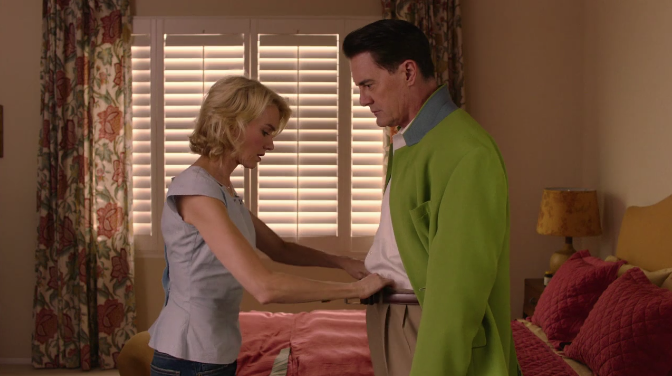
Light blue under collar
JANEY: Dougie, you've lost weight. Let me cinch this up. And this jacket looks two sizes too big. That black suit last night fit you perfectly. We'll just have to take that to the cleaners and maybe get you another one. Okay, you do your tie. I can never get that right. Now, I have to go downstairs and finish up breakfast. Hurry up. Sonny Jim! Get going!
(146-149) After she exits, Sonny Jim comes out of his room. He and Cooper-Dougie smile at each other. (150) He gives Dougie a thumb up and (151-153) Cooper-Dougie returns one, mirroring him, then he turns 180 degrees so he stands as Sonny Jim had, adopting his view, causing Sonny Jim to laugh. Cooper-Dougie has mirrored others but I think this is the first time he has turned 180 degrees and that it must be due to his having observed his reflection in the mirror. He may have, at first, been uncertain he was seeing a reflection until he touched it.
(154-155) To jazz, Dave Brubeck's "Take Five", Cooper-Dougie appears for breakfast, Janey cooking, (156) Sonny Jim laughing at him as he wears his tie around his head. (157-158) Cooper-Dougie crosses to the table as (159) Janey continues cooking. (160) Sonny Jim, attentive to his father's behavior, is amused. (161) Cooper-Dougie stares, not knowing what to do. (162) Janey cooks. (163) Cooper-Dougie stares at Sonny Jim (163) who smiles in return. We try to parse what Sonny Jim's relationship might have been with Dougie as Sonny Jim quietly, with full acceptance, seems to manage how Cooper-Dougie acts as either playtime or a situation where he does indeed need to help his father but is not unaccustomed to this. (164-168) Sonny Jim pulls out a chair for Cooper-Dougie and seats him in it. (169-171) Janey brings him pancakes, (172) Sonny Jim already eating. (173-174) Cooper-Dougie considers what to do with the pancakes. (175) Janey gets a green apple, packing lunch. (176) Sonny Jim pours syrup on Cooper-Dougie's pancakes. (177) Janey packs a sandwich in plastic. (178-180) Cooper-Dougie attempts to use his fork and his Sonny Jim giggles.
(181) Janey brings (182) him coffee in a cup that reads (183) "I am Dougie's Coffee." (184) He stares, remembering. "Coffee." (185-186) Excited, he takes a sip, then spits it out it is so hot. (187) Janey exclaims. (188) He looks up happily and smiles. "Hi!"
The coffee is a major moment. He remembers coffee, but it does not return his memory. The viewer may hope that the coffee will jolt a return of memory, but Cooper-Dougie ends in only being delighted to have coffee back in his life.
The white cup with its black inside might remind of the black pool of "oil", surrounded by white rocks, in the center of the sycamores at Glastonbury Grove.
This is hilarious, but it also ties in with previously established threads. We return to the Heisenberg Uncertainty Principle, brought up in season two, which I discussed in part two in connection with the viscosity of liquid, the slow motion coffee dripping in "The Path to the Black Lodge", looking like pancake syrup, focused upon after an unexplained breaking of dishes when Cooper and Annie kiss. This is referenced when in the last episode of season two, the cup of coffee Cooper has in the Red Room is sometimes solid and sometimes liquid. I've written on this in part one of The Return. Here, it's illustrated in the pancake syrup that Sonny Jim pours for Cooper-Dougie, and then how Cooper-Dougie forcefully spits out his coffee when he takes a sip. Yes, it's supposed to be hot, but it is also a contrast of slow and fast.
The manner in which Cooper-Dougie has the tie around his head reminds of the question of whether it's about the bunnies or not, the tie forming a kind of bunny ears.
The owls are not what they seem? In the background is an orange ceramic cookie jar presiding over the scene, its oranginess punctuated by the 3 oranges observable under the bananas in the nearby bowl. I'm reminded of the 3 limes on the counter top in Dorothy's apartment in Blue Velvet and how they relate to the light green of the shawl that rests on the sofa.
In the previous scene, Wally had suddenly appeared so we had a family reuniting of Lucy, Andy and their son. Now we have a reuniting of Cooper-Dougie with Janey and Sonny Jim. Both sons have names that distance them in some way from their family. Wally goes by Wally Brando rather than Wally Brennan. Sonny Jim's name would be expected if his father was named Jim, but his father instead goes by Dougie. With Wally, extremes are taken to communicate this is a son who loves his sweet parents and they adore him. Sonny Jim, too, behaves with Cooper-Dougie as if they have an affectionate relationship.
It was one thing to shock the return viewer with Cooper-Dougie stumbling around the casino. Another thing to continue with Cooper-Dougie fumbling about in this extended breakfast scene. But this immersion forces the viewer to connect with Cooper-Dougie and his family rather than relate to them only as plot. The anchors for the viewer may be the clues that are given, looking for when they might appear, those things Cooper was told in the first episode. Those intellectually involve. But Cooper-Dougie connects emotionally and viscerally. He is as raw a character as ever imagined for the screen.
ACCESS DENIED
OUR TIMELINE BEGINS TO FALL APART
The sheriff's department in Buckhorn. (1) A computer screen that reads BUCKHORN POLICE S.D. Then ACCESS DENIED.
(2) It's Constance's office. Two windows seem to show it as being night but light perhaps from a third enters also showing gold on the floor and on Constance's jacket as she hurries through the room with the sheriff and the police chief. The read is certainly that of night.
Constance wears the same green shirt she had on when she identified Bill Hastings' prints as being all over Ruth Davenport's apartment in part one.
CONSTANCE: You have to see this. We got a hit on the print we took off the male John Doe.
BOYD (entering): What's the name?
CONSTANCE: Don't know. It's blocked. Some kind of security issue.
DAVE: Can you tell who blocked it?
CONSTANCE: Military.
DAVE: Oh.
(3) The ACCESS DENIED; MILITARY AUTHORIZATION REQUIRED screen.
First and foremost, the scene pushes ahead with Briggs likely being identified as the John Doe. But something else is going on. This projects as a night scene. It's likely to be perceived as a night scene. As such, it's one of several scenes that have begun to disrupt the viewer's natural disposition towards a linear timeline.
FACES OF STONE
MOUNT RUSHMORE, LINCOLN AND FACES OF STONE / TAMMY'S CAR SICKNESS AND Mr. C'S ACCIDENT / COSSACKS / UP ON THE WRONG SIDE OF BED
(1) Tuesday morning. Despite the confusion wrought by the previous scene, we know it is Tuesday morning because Cole had said they would be at Yankton the following morning to have a meeting with Cooper at 9 sharp. Gordon, Tammy, and Albert exit a regional airport into what appears to be early morning light and are greeted by two FBI agents. Gordon thanks them for meeting them and says, "Let's get going." They climb in a car with license plate 59NR01. The make is a Lincoln, the same as Mr. C had been driving when he had his collision, even the same year. One of the agents returns to the building and the other climbs in the car to chauffeur.
(2) Cut to a lonely view of a seeming South Dakota highway. Gordon had for some reason believed they were going to the Black Hills (where Buckhorn is) when those are on the west of the state whereas the Yankton prison is in the east of the state. Now, he realizes they are nowhere near the Black Hills and Albert has a photo ready to make up for their being nowhere near it. We might be reminded of black-and-white Cooper speaking with ??????? in part one and how Cooper had been told he was far away and then disappeared.
We have yet another Lincoln as Lincoln is one of the presidents carved on Mount Rushmore. Lincoln street in Blue Velvet was the road that took Jeffrey into the underworld. We had Mr. C in his Lincoln car, a repeated focus being the Lincoln clock approaching 2:53. Jade gave Cooper-Dougie a five dollar bill (Lincoln bust) with which to call for help. Now the FBI agents ride in a Lincoln the same make as was Mr. C's, and Albert gives Gordon a picture of Mount Rushmore on which is the face of Lincoln.
(3)
GORDON: We're not anywhere near Mount Rushmore.
(4) ALBERT (handing Gordon a photo of it): I brought a picture for you.
(5) GORDON: There they are, Albert. Faces of stone.
(6) Gordon looks quizzically at Tammy who is leaning against the car door, not saying anything.
(7)
ALBERT (explains Tammy's condition): Agent Preston gets car sick.
GORDON: Albert, we're in South Dakota. Cossacks are in Russia.
ALBERT (yells in frustration): Car sick!!!!
(8)
DRIVER (startled, jerks the car): Do you need me to pull over?
(9-11)
GORDON: Up on the wrong side of bed this morning, Albert.
As if we were not aware that this car was the same make as the one the doppelganger drove, the association is made with Tammy being carsick, which takes us back to Mr. C's becoming violently ill. Indeed, the driver then swerves wildly, in response to Albert yelling, "Car sick!" and we are reminded of the car crash.
Cossack etymologically comes from cosac, meaning "free man", and I'm not sure there might not be some relevance there. When Mr. C swerved and had his accident, it was approximately the time that Cooper left the Black Lodge and became a free man once more, albeit taking Dougie's place.
Russia presents some more word play on Rushmore.
Is Cooper-Dougie a free man? Either we can look at him as being imprisoned in Dougie's life with his loss of memory, or we can view him as freer than he has ever been in returning nearly as a blank slate, his memories inaccessible.
I WAS A LITTLE BIT BEHIND SCHEDULE WHEN MY CAR VEERED OVER ACROSS THE ROAD AND I HAD MY ACCIDENT
THE SHARED BIRTHDATE WITH BILL HASTINGS / 9-22 / INABILITY TO RECONCILE INCONCISTENCIES AND APPARENT ERRORS IN THE MUG SHOT INFO / THE THUMBS UP / YREV / THE ACCIDENT
(1-2) Cut to a view of a prison parking lot, supposedly in Yankton, and the Lincoln entering. All exit the car and go inside. (3) Then the interior of the prison and Warden Dwight Murphy (James Morrison) and another leading them down a hallway.
GORDON: What have we got?
MAN: We found him after his car went off the road. He'd been, uh, throwing up some kind of poison.
ALBERT: Must have eaten locally.
MAN: They're analyzing it in the lab. Exposure to it sent the highway patrolman to the hospital.
GORDON: Huh.
(4)
They enter a room with evidence on a table.
MAN: As I mentioned, the vomit's still in the lab. This is what we found in his trunk. (5) A view of the evidence. MAN: Cocaine. Machine gun. Dog leg.
(6)
ALBERT: What? No cheese and crackers?
GORDON: Apologies in advance for Albert.
(7) The man cuts on a screen showing the doppel's mug shot.
(8)
MAN: That's your man, right?
GORDON: Holy jumping George. Let's go talk to him.
(9) A last view of the mug shot.
The information on the mug shot has Dale Cooper, an address at 6147 Bend Dr. in Harrisburg, Pennsylvania, another address of 1000 Appleton St. in Philadelphia (place of work?), and a date of 9/22. He's six feet, 170 pounds, and was born August 15 of 1973. He was arrested in Buckhorn, South Dakota.
Cooper is shown as being about 75 inches tall in the photo, which is 3 inches taller than what his height is given as being.
The date of birth is off by many years as it supposedly should be (originally was) April 19, 1954. That's a difference of 19 years. Also, is the 9/22 supposed to be his arrest date? For if it is then that is a Thursday, when Thursday is when Ruth was killed and Monday is when Cooper's doppelganger was picked up. This is off, but then my estimated timeline could be off. What can't be explained is a birthdate being off by 19 years and anybody possibly believing that Cooper was born in 1973. Kyle MacLachlan was born in 1960 which would have made him 56 in 2016. Mr. C is obviously not 43. If born in 1973, he would have ben 16 when Laura Palmer was murdered.
Bill Hastings' drivers license had shown his birthday as being August 15 of 1973. Recollect that back at the Hastings was where we had seen the first photo of Kafka, which would make us think of The Metamorphosis.
Hastings' drivers license had shown Mount Rushmore, Gordon's "faces of stone", and we could compare the doppel's face and manner to being like stone.
Cut to the darkness of the observation room.
(10-11)
GORDON: Ladies and gentlemen, I am going to speak now to speak to Special Agent Dale Cooper.
MURPHY (off screen): We'll be down the hall if you need us.
GORDON: Thank you Warden, Murphy.
(12-13)
Murphy leaves the room and Gordon presses a button lifting a screen between them and Mr. C. (14) Mr. C gives an awkward thumbs up. (15) Gordon stares.
The thumbs up should take us back to the scene between Cooper and Sonny Jim so there seems to be some correspondance between them. Sonny Jim had given the thumbs up greeting and Cooper-Dougie had mirrored him, even turning and standing as Sonny Jim was standing.
(16)
MR. C (exceedingly stilted, mechanical): It's yrev good to see you again, old friend.
(17)
GORDON: It's very, very good to see you again, old friend.
(18)
MR. C: I haven't seen you in a long, long time.
(19)
GORDON: No, you haven't. This is true.
(20)
MR. C: Gordon, I've really, really missed spending time together.
(21)
GORDON: Yes, Coop. I, too, have missed our good times together. Where have you been all these years?
(22-24) Doppel with a reaction shot of Albert.
MR. C: Gordon, I've been working undercover all these years, working primarily with our colleague Phillip Jeffries.
(25)
GORDON: Phillip Jeffries?
(26-27) Shot of Albert then the doppel.
MR. C: I need to be debriefed by you about this work, Gordon. I will tell you the whole story, all its twists and turns. And I was going to do so. I was on my way to present it to you. I was a little bit behind schedule when my car veered over across the road and I had my accident.
(28)
GORDON: Yes, Coop. This is how and why we found you.
(29-33) The doppel and reaction shots.
MR. C: I need to be debriefed by you, Gordon. I was on my way to present it. I was a little bit behind schedule when my car veered over across the road and I had my accident. I've left messages.
(34) Did the doppel glance slightly over to Albert when he said he'd left messages? We have a reaction shot of Albert. (35) The doppel is looking at him. (36) Albert.
(37)
GORDON: What messages were those, Coop?
(38)
MR. C: Messages so Phillip knows it's safe. (39) Albert looks down. (40) Gordon looks at Albert. (41) Group shot. (42) MR. C: Gordon? When are you going to get me out of here?
(43)
GORDON: Coop, these fine fellows here have sufficient cause to hold you for now.
(44)
MR. C: Of course I will be exonerated in courts of law.
(45)
GORDON: Very good, Coop. And rest assured that we are working to bring you back home for our talk.
(46)
MR. C: I've never really left home, Gordon.
(47)
GORDON: See you soon, old friend.
(48) Mr. C gives a thumbs up, (49) as does Gordon. (50) Group shot. (51) Lower curtain on a very awkwardly frozen smiling doppel continuing to give a thumbs up. (52) Group shot.
(53) Cut to Gordon, Albert and Tammy being led out by the Warden and the other man.
MAN: We can hold him for two more days without filing any charges.
GORDON: I assume you haven't given him his phone call.
MURPHY: No, we haven't.
GORDON: Warden Murphy, I suggest you give him his private phone call and I expect to hear all about it.
Mr. C was somewhat stiff before but not like this. He almost seems robotic.
We note that he says "very" backwards. Red Room speech.
And we have to question why his repeat, if fractured, of, "I need to be debriefed by you, Gordon. I was on my way to present it. I was a little bit behind schedule when my car veered over across the road and I had my accident."
I KNOW WHERE SHE DRINKS
THE BLUE CAST TO THE SCENE / TAMMY'S WIRE / ALBERT, ALBERT, ALBERT / WHY DID ALBERT NOT TELL GORDON ABOUT JEFFRIES AND COOPER / THE ACCIDENT
(1) Cut to a blue-toned exterior shot of Gordon, Tammy and Albert speaking together. .
TAMMY: He wasn't going to Philadelphia. He was headed west. A few people who have come in contact with him have gotten physically ill. Are you feeling all right, Albert?
(2)
ALBERT: I'm fine, Tammy.
TAMMY: And who is Phillip Jeffries?
ALBERT: He's a former FBI agent.
(3-4)
GORDON (takes out a red device and by this detects Tammy is wearing a wire): You're wearing a wire, Tammy.
(5)
TAMMY (frustrated): You asked me to.
(6)
GORDON: Right. Go wait in the restaurant.
(7)
She sighs, exasperated, and marches off. They watch her as she goes.
(8-9) ALBERT (watching her): I'm feeling better now.
(10)
GORDON: Albert, your reaction in prison to Cooper. I've not seen this before. Is there something you'd like to tell me?
(11)
ALBERT: Well, since you asked, and I can't tell you how sorry I am about this, I authorized Phillip to give Cooper some information.
(12)
GORDON: Cooper and Phillip? What the hell. Phillip Jeffries has been off the radar for years.
(13)
ALBERT: This was years ago, Gordon. He called me.
(14)
GORDON: He did, did he?
(15)
ALBERT: I know. I thought Cooper was in trouble. At least that's what Phillip said. "Urgent," he said. Cooper needed this information urgently.
(16)
GORDON: Did you talk to Cooper?
(17)
ALBERT: No.
(18)
GORDON: What information did they want?
ALBERT: I told Phillip who our man was in Columbia.
(19)
GORDON: And?
ALBERT: A week later, that man was killed.
GORDON: Albert. Albert. (20) Albert. (21) A high pitched squealing enters. Back to Gordon. GORDON: Albert. Gordon stares at Albert as the squealing continues. It stops. GORDON: This business that we witnessed today with Cooper, I don't like it.
(22)
ALBERT: No.
GORDON: Something's wrong.
(23)
ALBERT: Yes.
GORDON: It could be the accident, but I don't think so.
ALBERT: No. (24) His shoes scrape on the pavement causing intense feedback whine for Gordon.
(25-28)
GORDON: Albert...that sound you just made of your feet on the concrete, it's like a knife in my brain.
ALBERT: I'm sorry, Gordon. (Another feedback whine from his voice.)
GORDON: Albert! This thing is turned up to the max. Please.
ALBERT (softly): I'm sorry, Gordon.
(29)
GORDON: I don't think he greeted me properly, if you take my meaning.
(30)
ALBERT: No, he didn't.
GORDON: Something is very wrong.
ALBERT: Yes.
(31)
GORDON: Albert, I hate to admit this, but I don't understand this situation at all.
(32)
ALBERT: No.
(33)
GORDON: Do you understand this situation, Albert?
(34)
ALBERT: Blue rose.
(35)
GORDON: It doesn't get any bluer. Albert, before we do anything else, we need one certain person to take a look at Cooper.
(36)
ALBERT: I'm right with you.
GORDON: Do you still know where she lives?
ALBERT: I know where she drinks.
Following the time confusion of the access denied scene in Buckhorn, we have more confusion with this seeming to be a night scene. We can't begin to tell if they are still at the prison or not, but it's reasonable to assume they are as they are speaking about what they have just witnessed. If the interview was at 9 in the morning, it couldn't possibly be night. We need to think of this as either referring to the Blue Rose cases or Jacoby's eyeglasses, the blue lens that when over the left eye suppresses the intuitive side of the brain.
Why did Gordon ask Tammy to wear a wire then query her about it?
Why the focus on the soft squeal as Gordon says "Albert" three times, then returns to their conversation? Why the focus on Albert's shoes on the pavement feeling like a knife in Gordon's brain?
Why did Albert not previously give Gordon this information on Jeffries and Cooper many years ago when the contact had happened, especially when someone had ended up dead? Albert says that Jeffries called him asking for information that would help Cooper. Whereas "Cooper", stating he had been working undercover with Jeffries, directed his attention to Albert when saying that he had "left messages" so Phillip would know it was safe. I'm not sure how we can reconcile these two conversations.
James Hurley is given as having had a motorcycle accident that modified his behavior. Albert and Gordon consider whether or not "Cooper's" accident had modified his behavior but they don't think that's the case.
I know where she drinks. Who knew Cooper more intimately than anyone else? Who did he send recordings of his daily life to? Would it be his secretary, Diane?
THE BANG BANG
Cut to the Bang Bang club and Au Revoir Simone playing "Lark". Erika Forster, with her blond hair, strongly evokes a young Laura Dern.
So long ago
There wasn't anyone out there I thought I needed to know
But no more
When I find the day leave my mind in the evening just as the day before
I saw the window was open
The cool air
I don't know what you saw there
Don't know what you saw in me
Sometimes I want to be enough for you
Don't ask
Know that it's understood
There's not enough of me
I saw that something was broken
I've crossed the line
I'll point you to a better time
A safer place to be...
STAB AT A TIMELINE
A timeline as best as can be reasoned on information
given thus far:
PART ONE:
1. Supernatural - B&W room
2. Jacoby's trailer,
day - Wednesday?
3. New York, Sam and Tracey, after 10 at night -
Wednesday
4. The Great Northern Lodge, Ben and Jerry, day -
Thursday
5. Twin Peaks Sheriff's Department, Lucy and the insurance
agent, day - Thursday
6. Buella's, night - Thursday
7. New York,
2nd night (we know this is certain) - Thursday
8. Buckhorn, South
Dakota, discovery of Ruth, day - Friday
9. Twin Peaks, Margaret
calls Hawk at work, night - Friday
10. Buckhorn, the coroner's, day
- Saturday
11. Buckhorn, Hastings taken into custody, day -
Saturday
12. Twin Peaks, Hawk, Lucy and Andy in the conference room,
day - Saturday. (Lucy wears the same clothes as in the scene with the
insurance salesman, but this scene and that one are separated by at
least one night in Twin Peaks. Hawk had spoken with Margaret at night, at
the office, but this scene is in daylight and so is another day.)
13. Buckhorn, Hastings interrogated - Saturday
14. Buckhorn,
Hastings home searched - Saturday
15. Supernatural - B&W room.
PART TWO
1. Buckhorn, Phyllis visits Bill in jail -- Saturday (Bill was picked up
on Saturday, presumably)
2. Buckhorn, Mr. C kills Phyllis --
Saturday night
3. Las Vegas, Duncan and Roger in Las Vegas, a woman
is given a job -- Saturday night
4. Buckhorn, Darya, Ray, Jack and
Mr. C eat at the motel's diner -- Saturday night
5. Twin Peaks, Hawk
visits Glastonbury Grove - Saturday night
6. Laura disappears from
the Red Room -- Undetermined time but perhaps equivalent to Saturday
night in real time
7. Buckhorn, Jack and Mr. C hide the Mercedes,
Ray lands in prison -- Sunday
8. Buckhorn, Jack and Darya killed by
Mr. C -- Sunday
9. Supernatural, Cooper looks out on Mr. C driving
the car -- Monday (as far as Mr. C goes)
10. New York, Cooper drops
into the New York box -- Fall back to NY Thursday
11. Twin Peaks,
Sarah Palmer watches television -- Undetermined time, can't be stated
with any confidence right now due to Cooper's slipping into Thursday and
then being swept out into space again. Perhaps Thursday.
12. Twin
Peaks, Shelly and James are seen at The Bang Bang -- Undetermined time,
can't be stated with any confidence right now due to Cooper's slipping
into Thursday and then being swept out into space again. Perhaps
Thursday.
PART THREE
1. Cooper falls through space, spends time with Naida and American Girl,
then takes Dougie's place. The American Girl's watch seems to read
Saturday the first. Frost's The Secret History of Twin Peaks is
based on a dossier of events relevant to Twin Peaks that is being
researched by Tammy Preston in August of 2016, and which is finally
determined to have been put together by Major Briggs. Saturday falls on
a 1st on 2/1/2014, 3/1/2014, 11/1/2014, 8/1/2015 and 10/1/2016. If this
is 2016 then this Saturday the 1st that was on the American Girl's watch
would likely have to be October 1st of 2016--but in the otherworldly
space who's to say what year it is? SA could instead refer to Saturn
(and perhaps does as well). If the date is Saturday the first, we still
have Mr. C driving down the highway on, according to prior events, what
should/could be a Monday. Right now we would take it for granted that
Dougie is replaced by Cooper during the same time frame, on Monday,
though it may be Saturday, October the 1st in this room with the
American Girl. - Monday (as well as perhaps Saturday October 1st)
2.
Buckhorn, Mr. C found on the highway - Monday
3. Twin Peaks
Sheriff's Dept bunnies. Perhaps this is Monday. - Monday
4. Twin
Peaks, Jacoby's shovels. Also perhaps Monday. - Monday
5. Las Vegas,
Back to Vegas and the Silver Mustang Casino, this occurring on the same
day that Cooper replaces Dougie. - Monday
6. Philadelphia, The FBI
meeting at sunset. - Monday
7. Twin Peaks, The band at the Roadhouse
would be a night scene. Just based on all previous shots in this episode
being during the day, I will go with this being Monday night. -
Monday
PART FOUR
1. Las Vegas, The house with the red door. If it was Monday when Cooper returned as Cooper-Dougie, it is still Monday as he is still at the casino. He goes to the Jones household on Monday night. - Monday
2. Philadelphia, The meeting of Gordon with Denise over taking Tammy to South Dakota would be Monday night as Gordon had earlier said they would be in South Dakota the next morning. - Monday
3. Twin Peaks, Frank Truman's return to the Twin Peaks Sheriff's Department fits with possibly being Monday night as Maggie tells him about an incident, seemingly that day, of a boy overdosing in class, a school day. - Monday
4. Las Vegas, Tricked. Las Vegas morning at the Jones household. This would be the following morning. - Tuesday
5. Buckhorn. Access denied. A seeming wrench is thrown in. It looks like night at Buckhorn in Constance's office with the news that there is a security issue on the prints of the John Doe.
6. South Dakota. Faces of Stone. The ride to the Yankton prison would be Tuesday morning. They are to be there at 9. - Tuesday
7. South Dakota. The meeting with Cooper's doppelganger. This is approximately at 9 on Tuesday morning. Another wrench is thrown into the timeline with the date, perhaps, of Cooper being picked up given as 9/22. 9/22 in 2016 is on a Thursday. 9/22 in 2015 is on a Tuesday. 9/22 in 2014 does fall on a Monday, so that would fit if we were moving 25 years forward from the Twin Peaks events of February 1989 (aired in 1991), but The Secret History of Twin Peaks has Briggs' dossier being research in 2016 and the comments made while it is being researched don't indicate any knowledge on Cooper or Briggs past when the original series ended so it seems it would be researched before the events in The Return. Cooper's birthdate on his prison information is also wrong, off by nineteen years. - Tuesday (I'm sticking with Tuesday for now, based on the Thursday death of Ruth)
8. South Dakota. The blue night scene in which Gordon and Albert discuss Cooper and the Blue Rose cases. I think it's not night, that it is instead blue because of Blue Rose. - Tuesday.
Approx 15,500 words or 31 single-spaced pages. A 119 minute read at 130 wpm.
Prior: Go to Part 3
Next: Go to Part 5
Go to Table of Contents for Analysis of Twin Peaks Return
Link to the main TOC page for all the analyses

